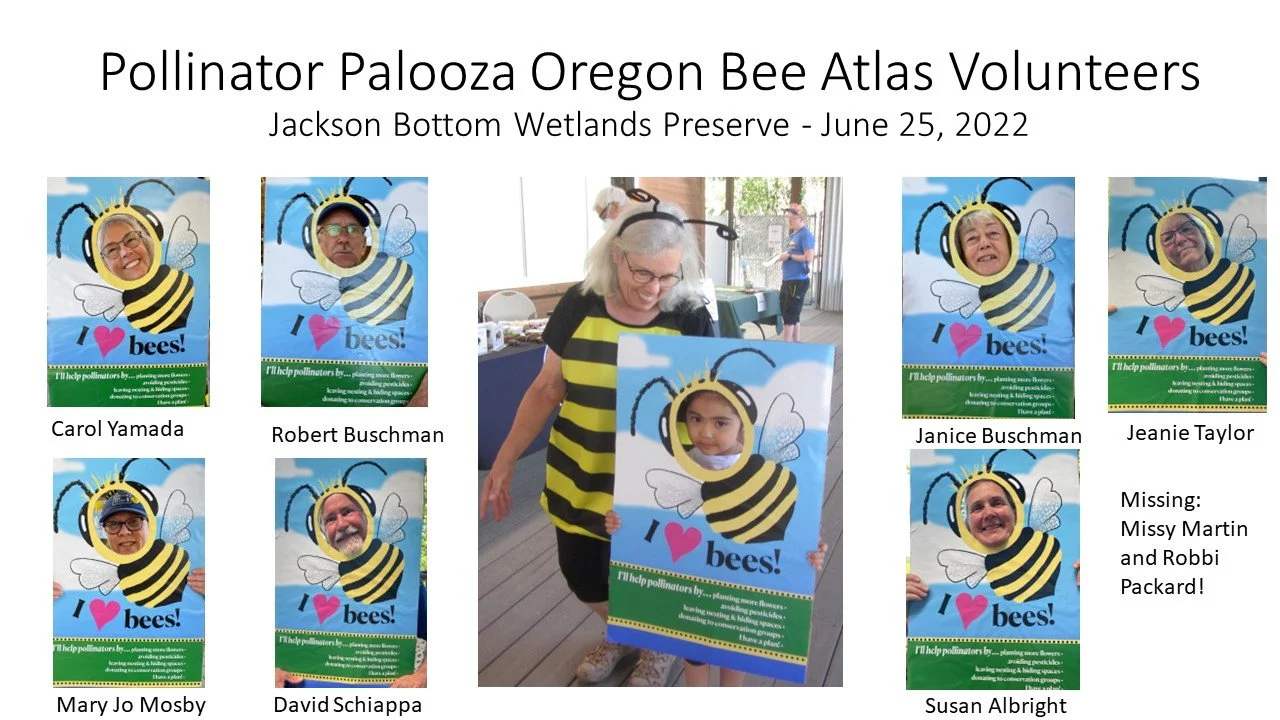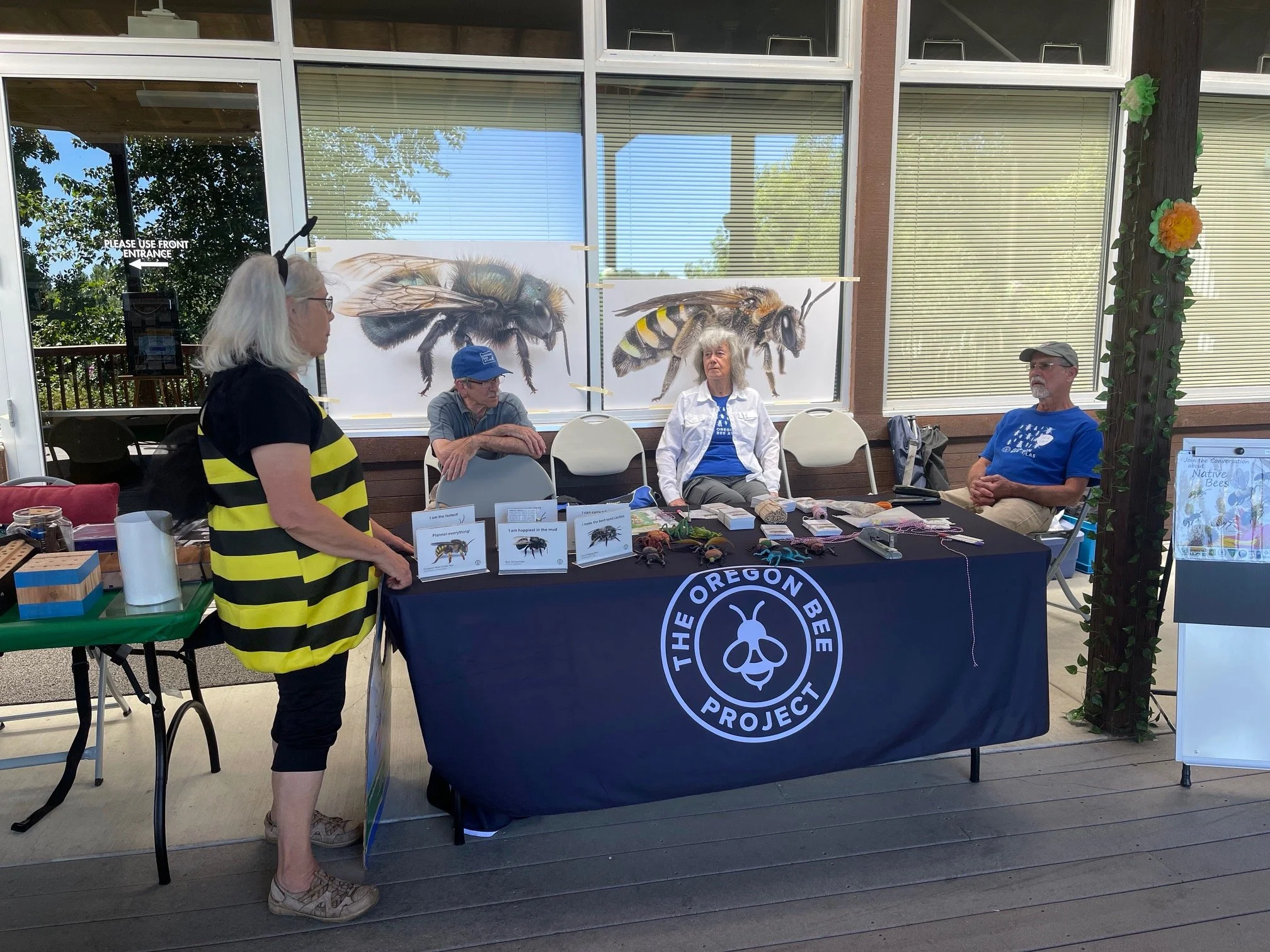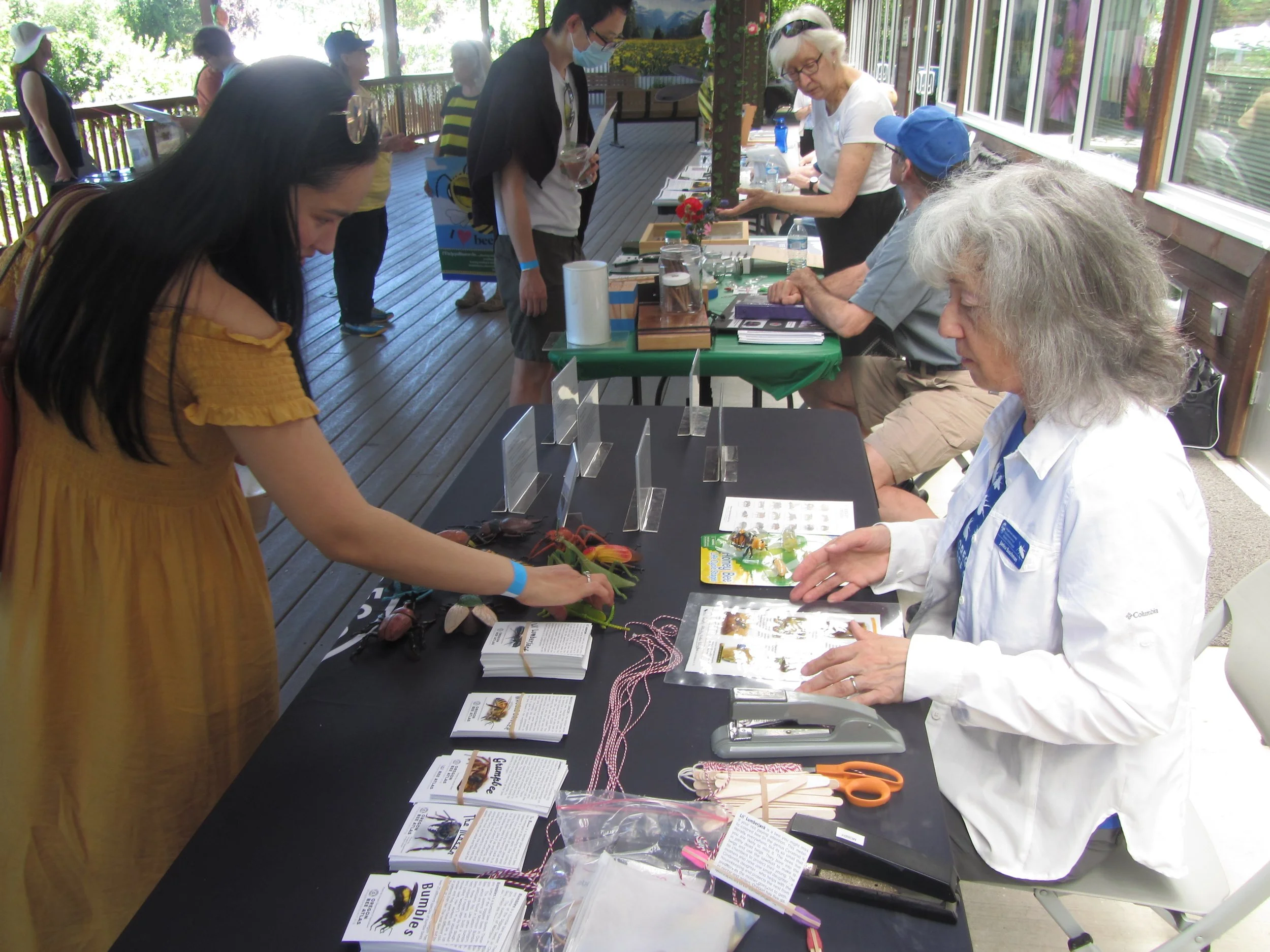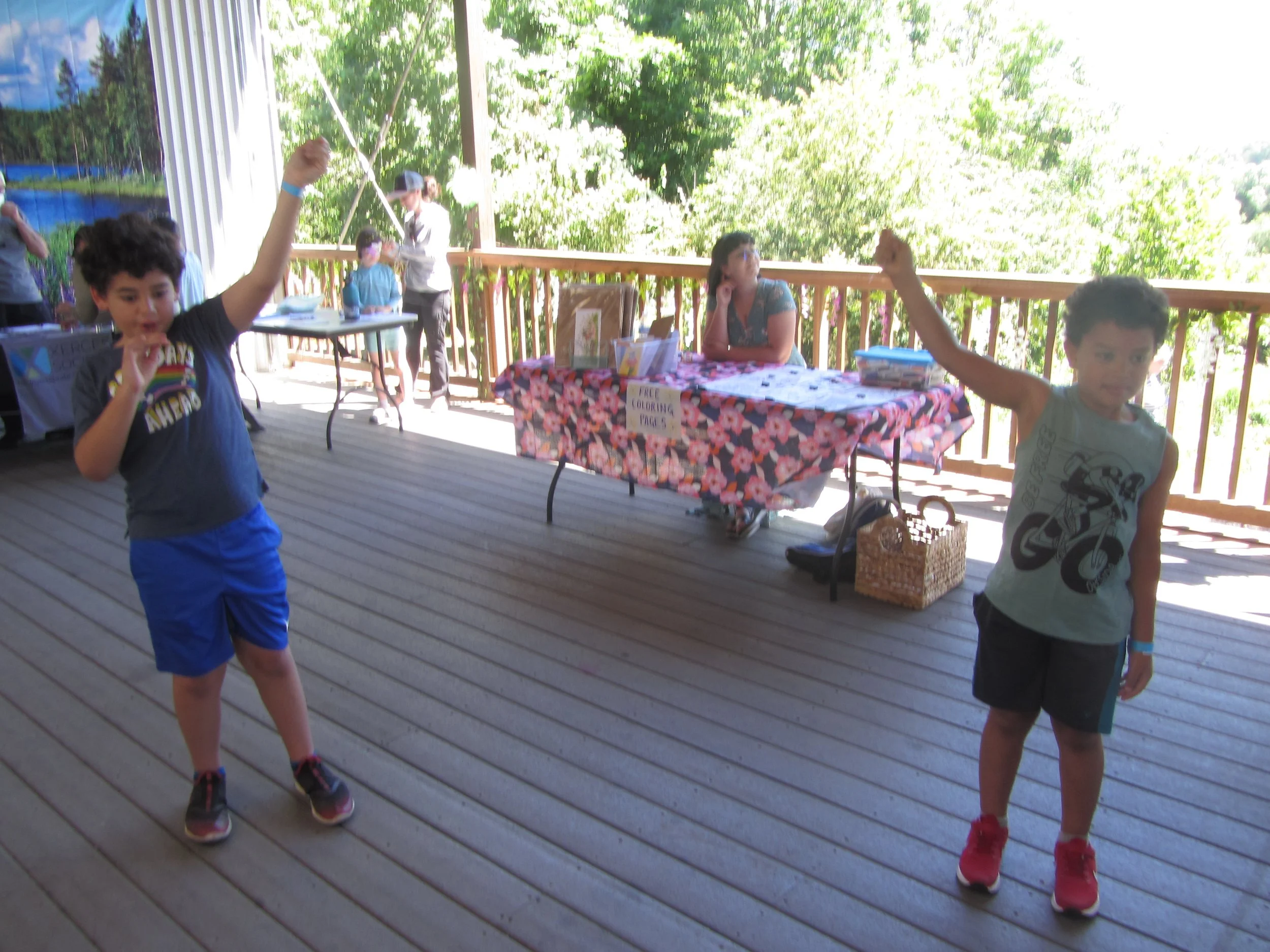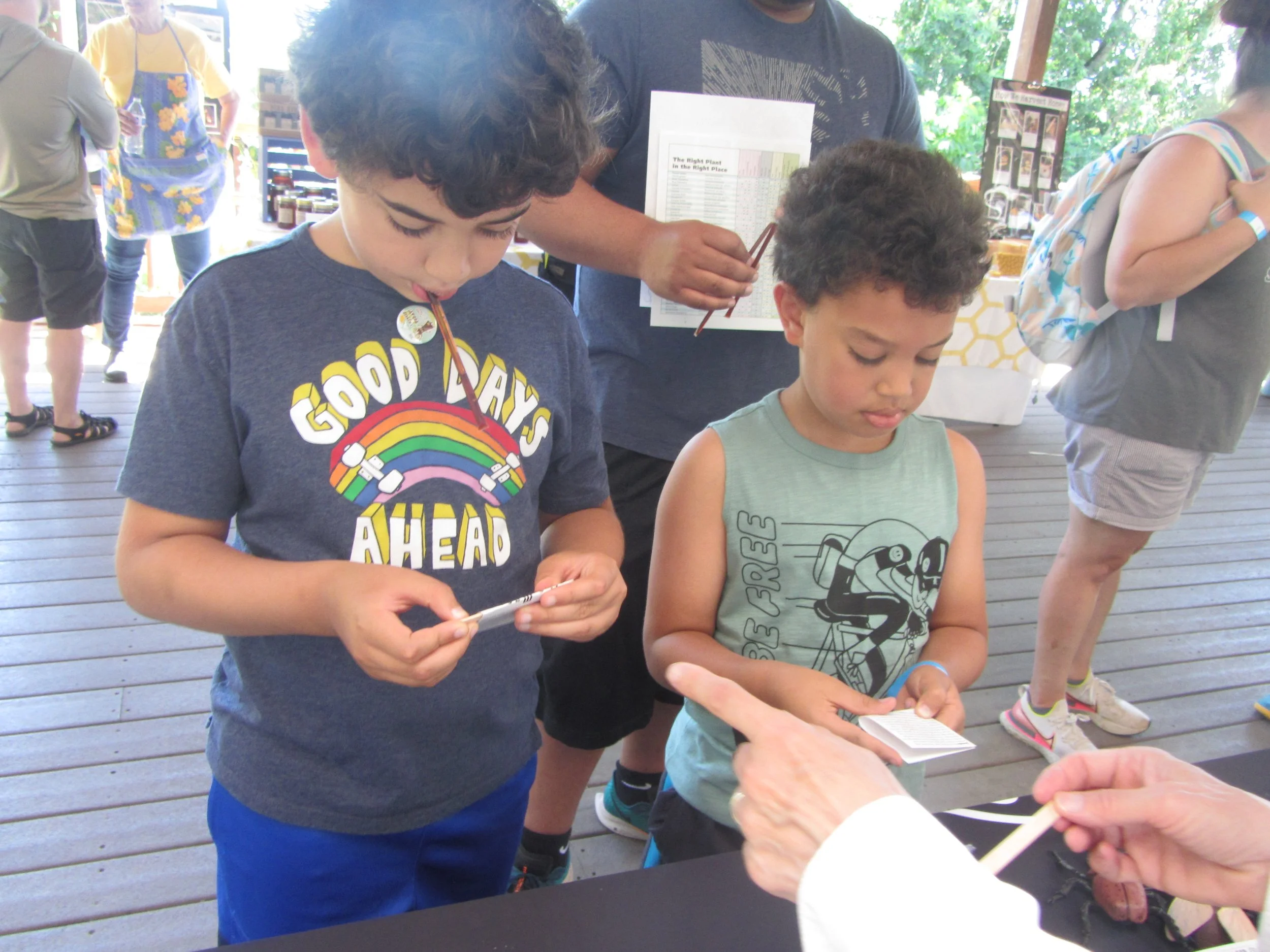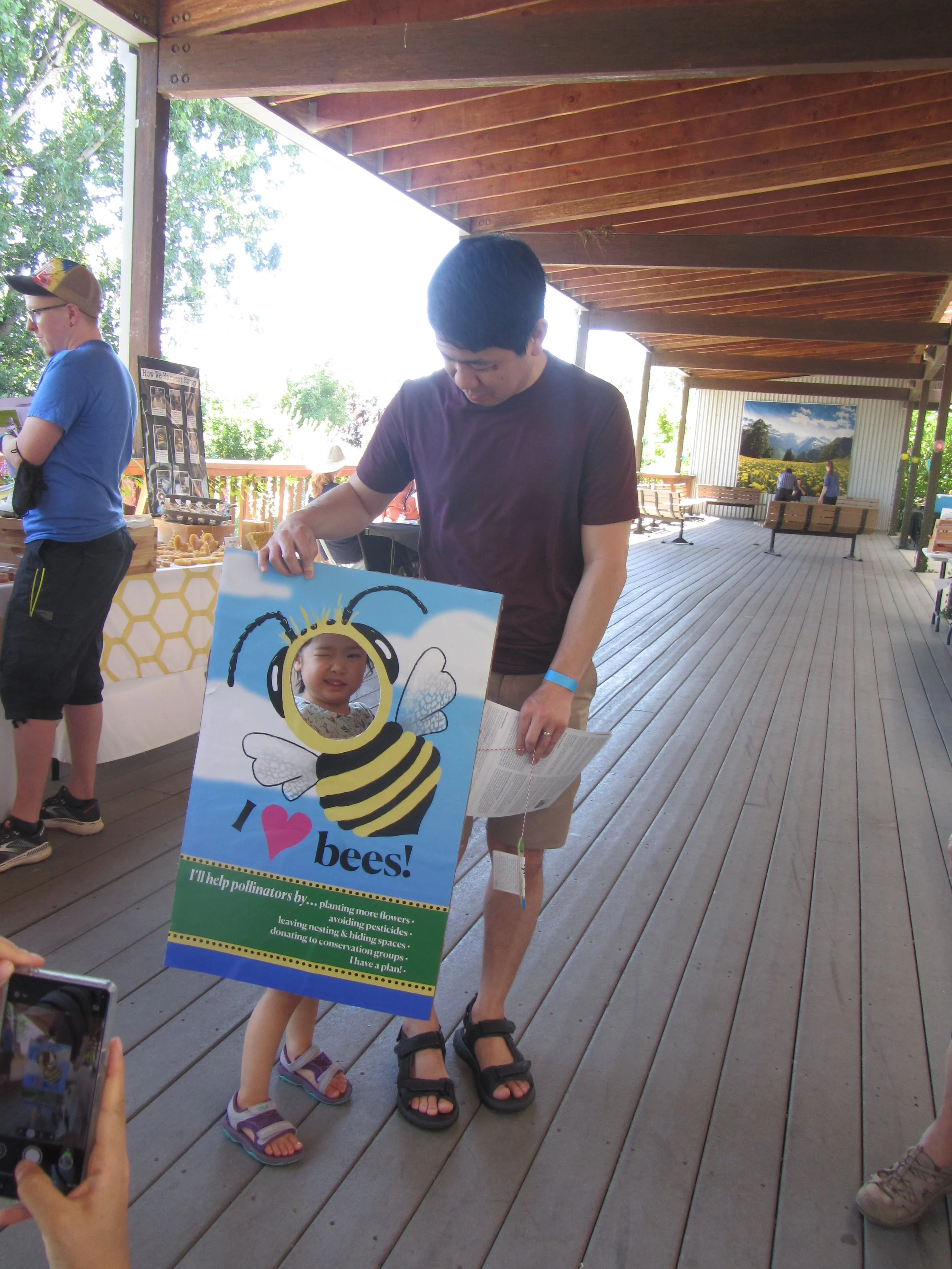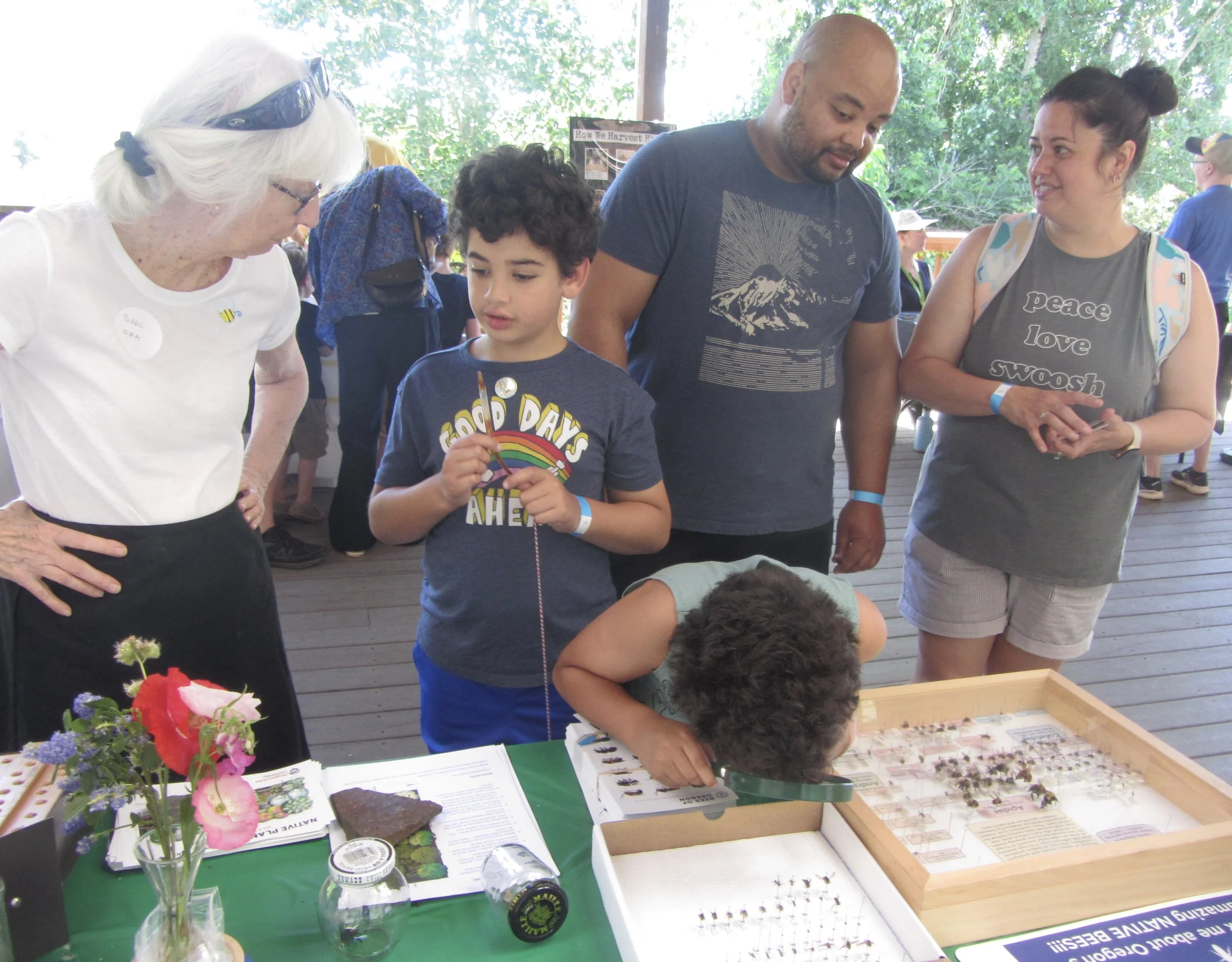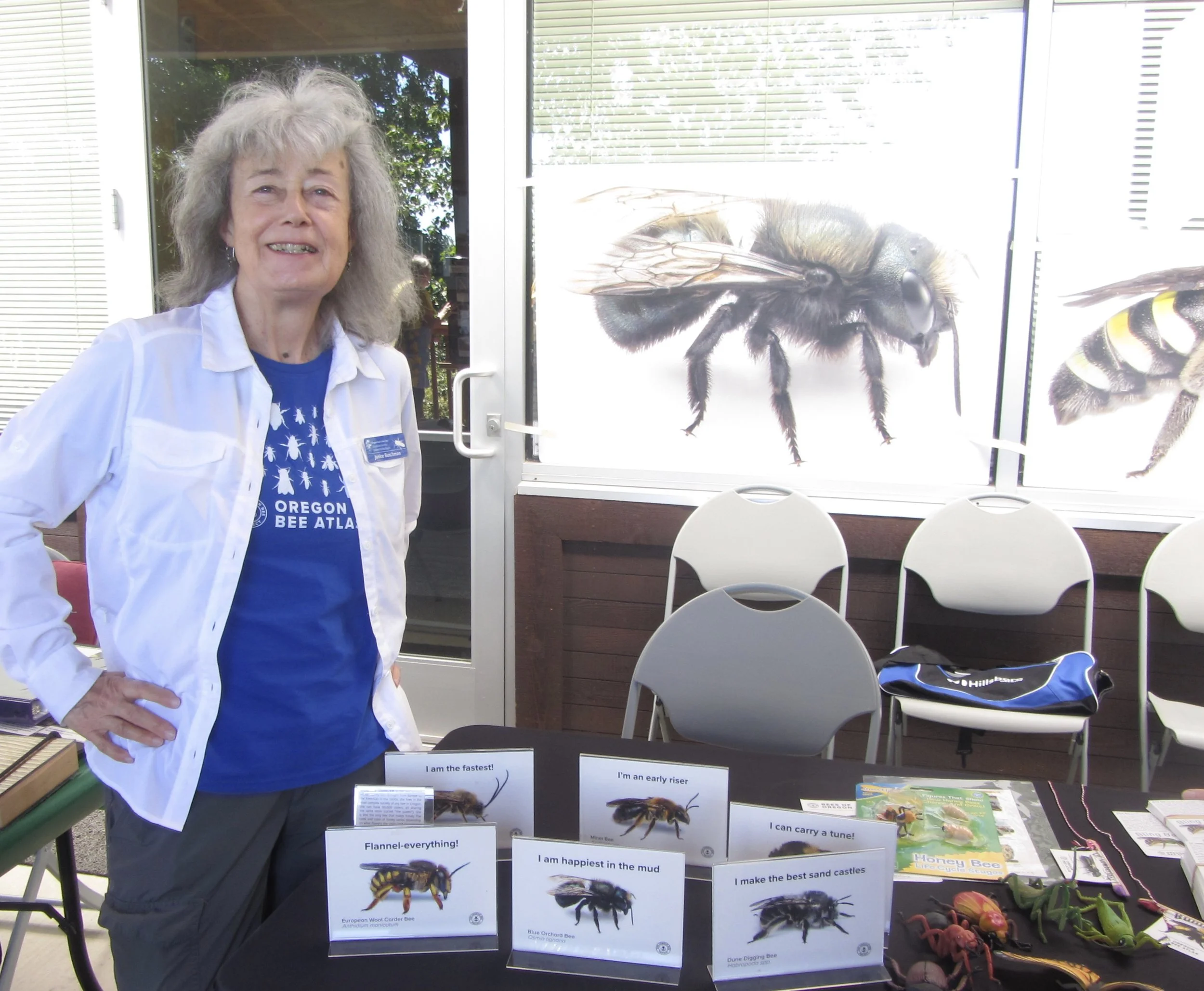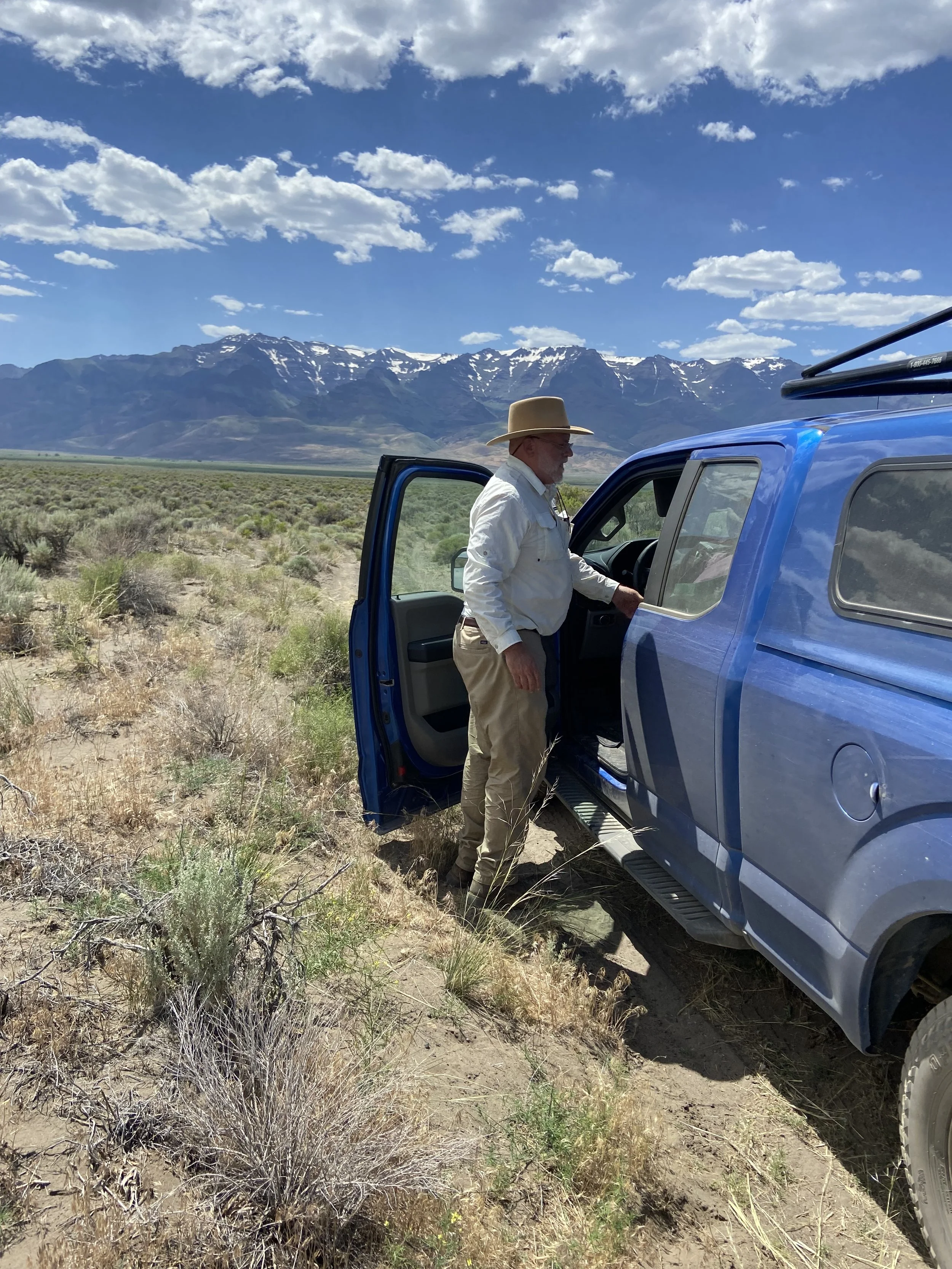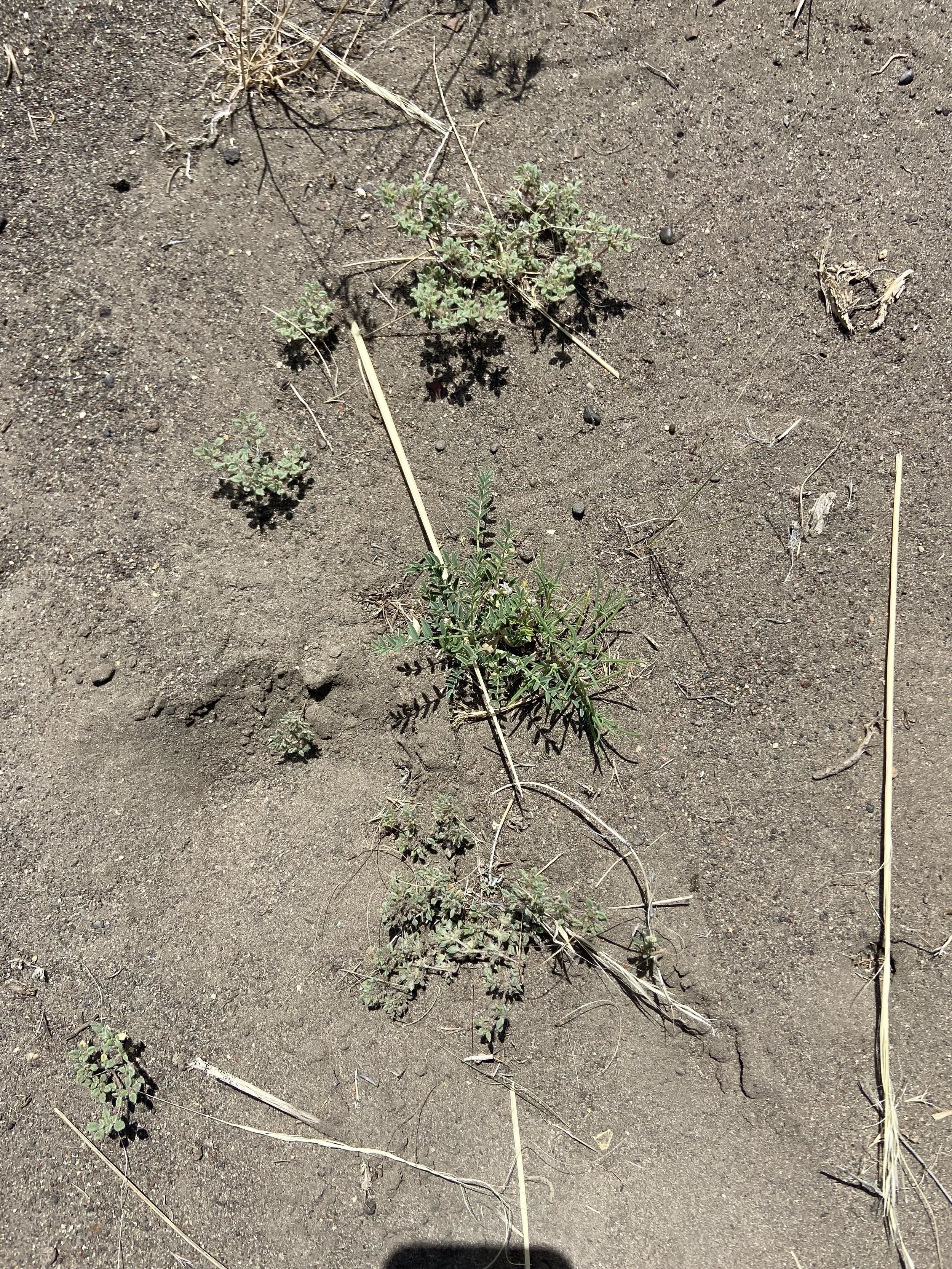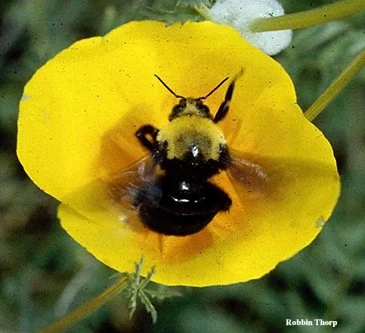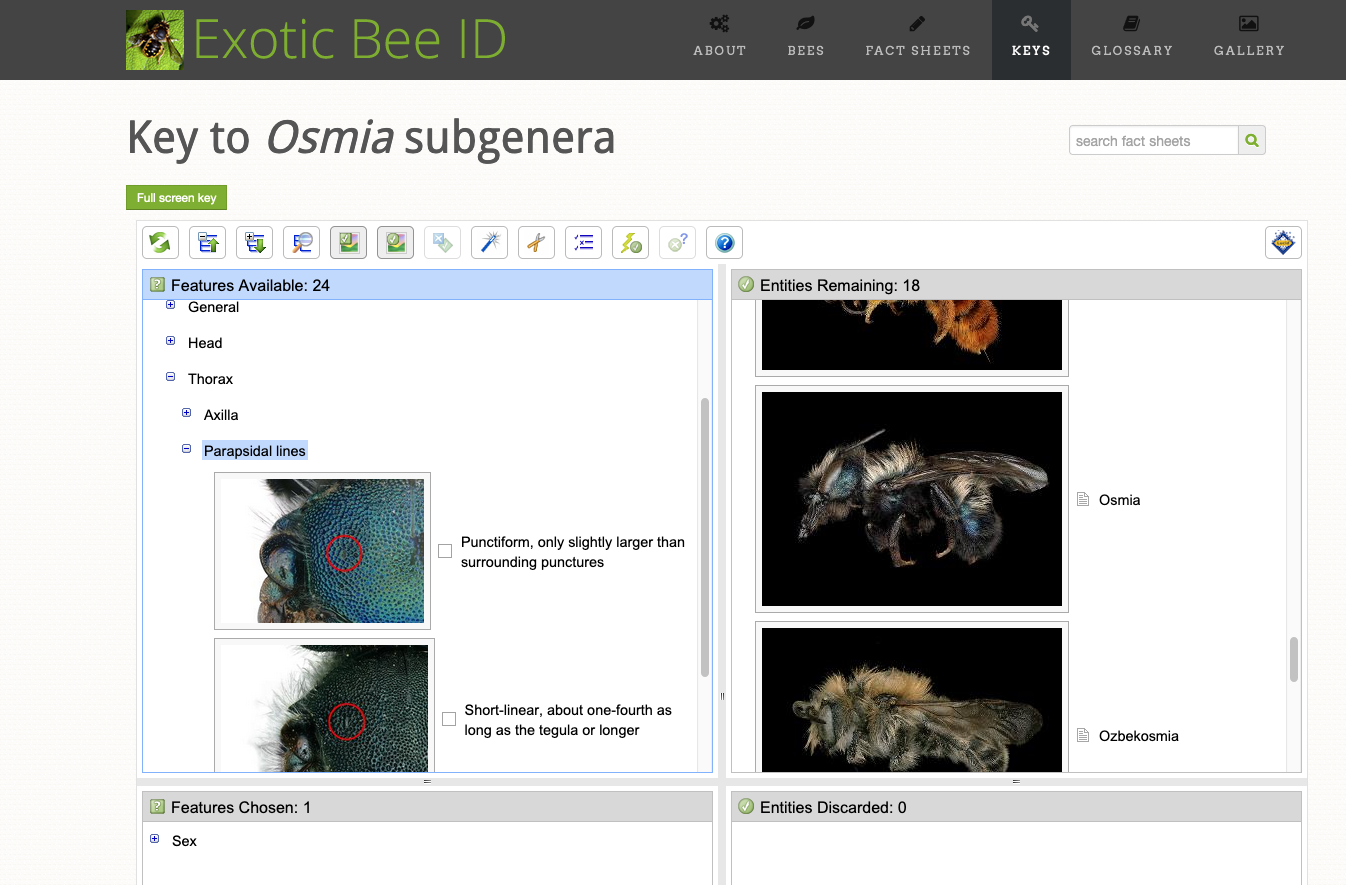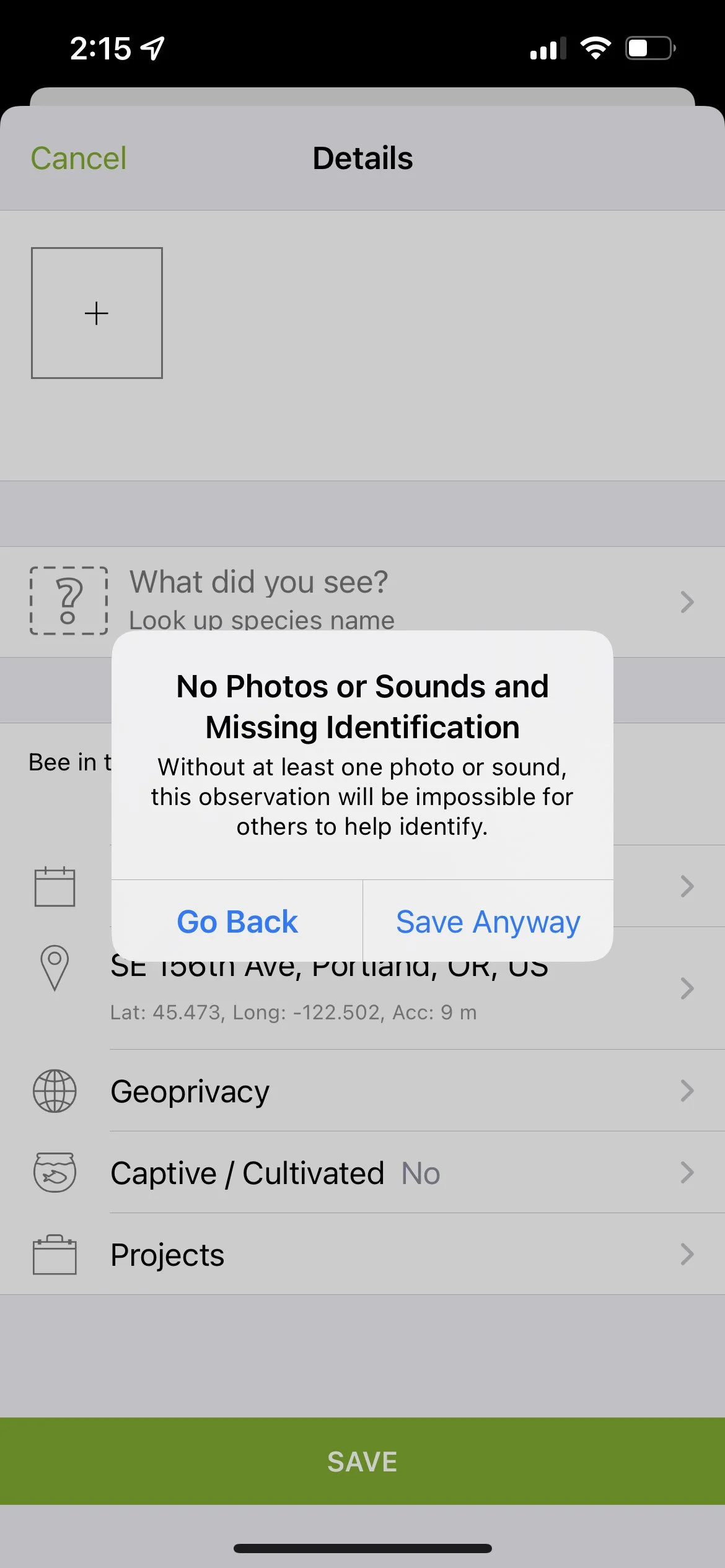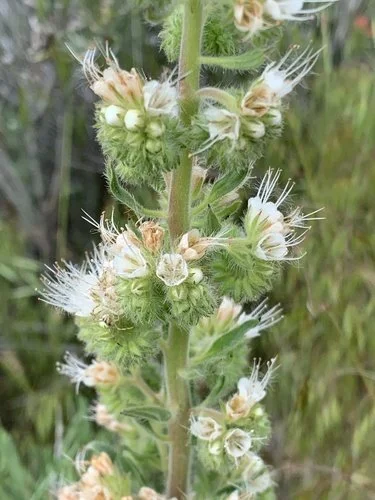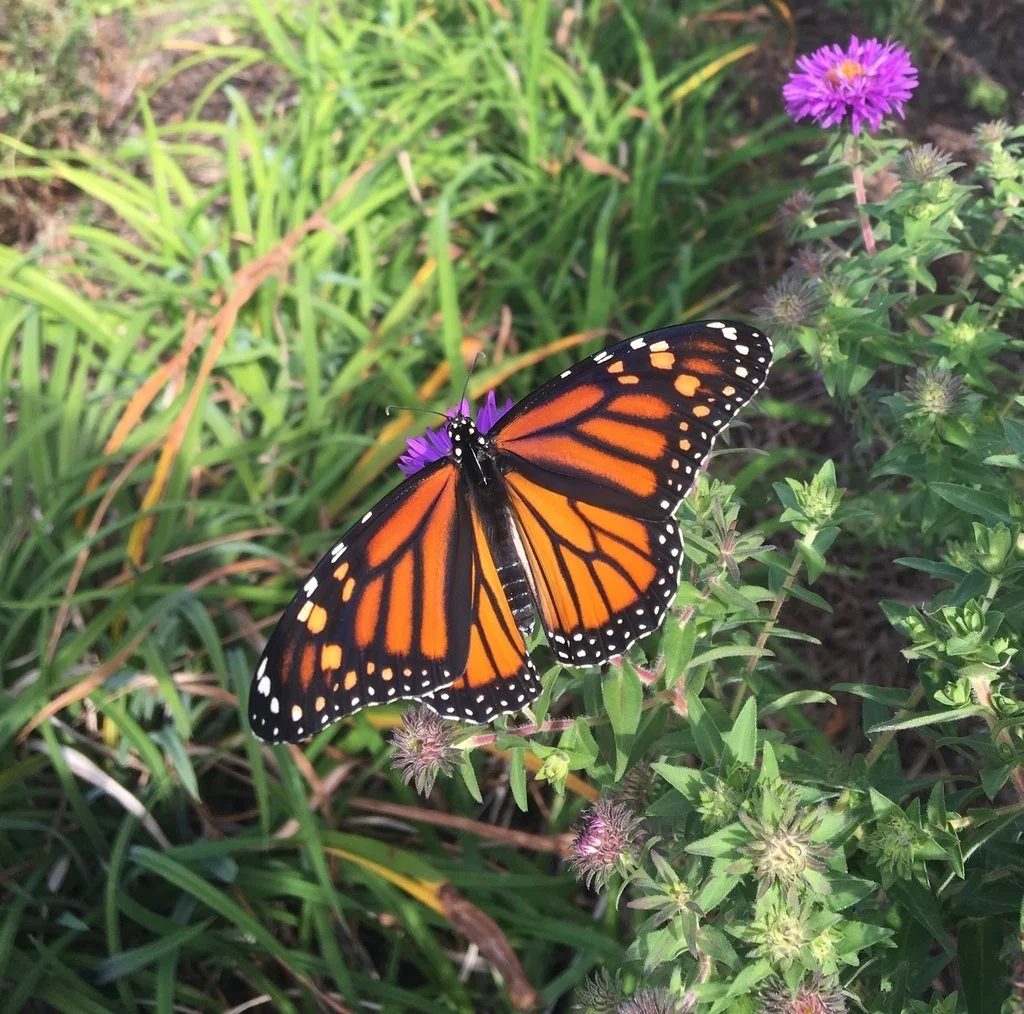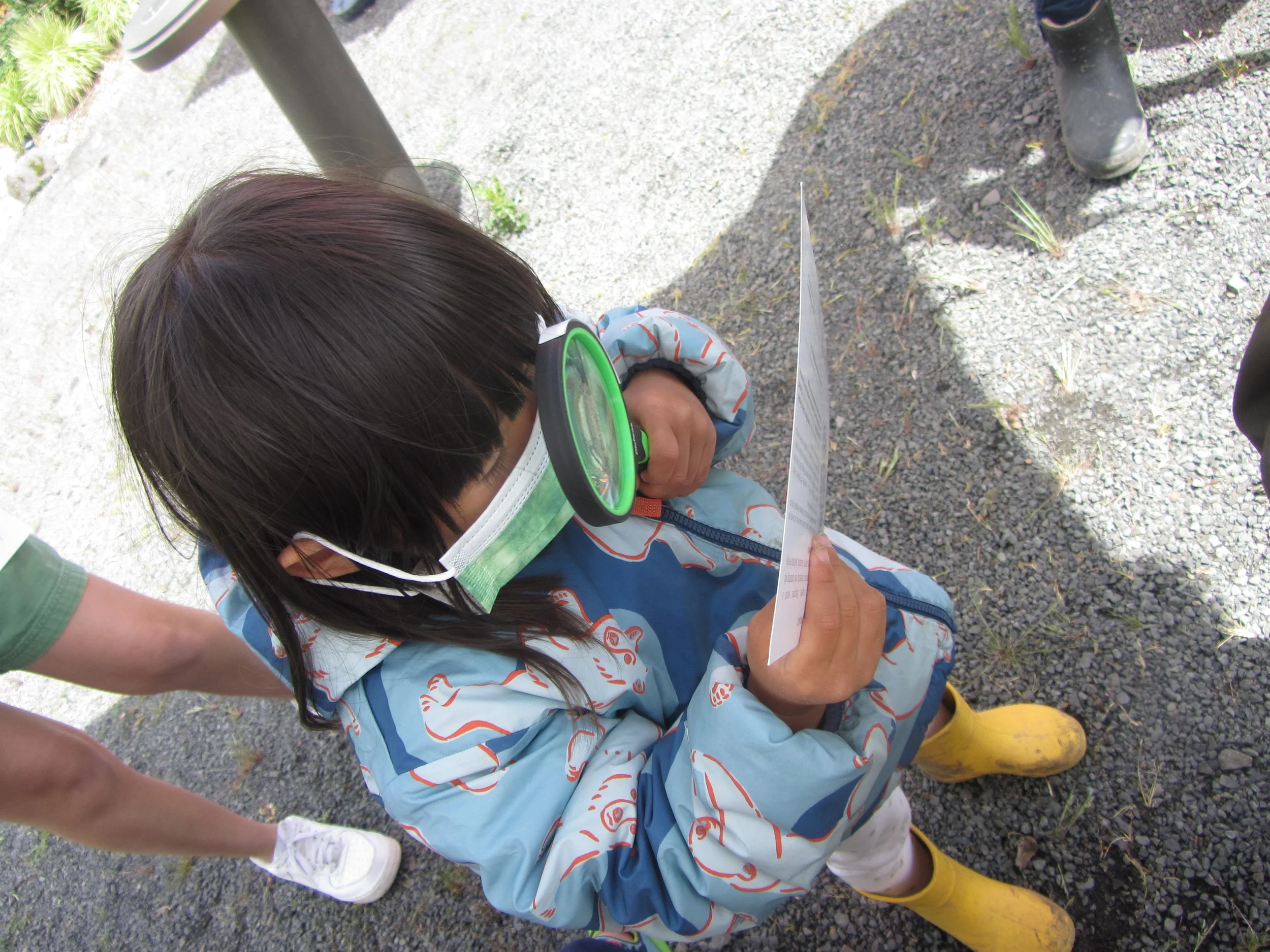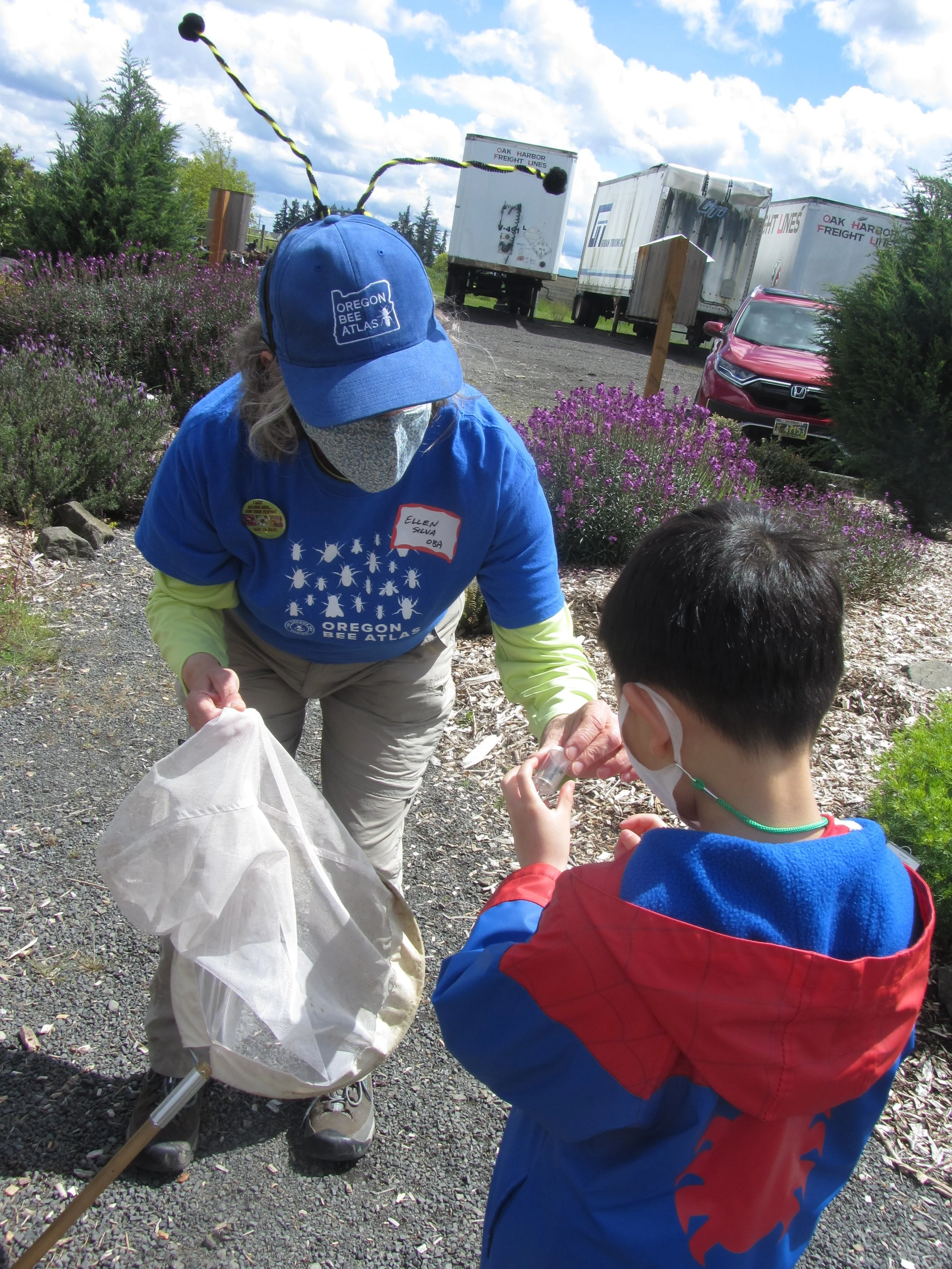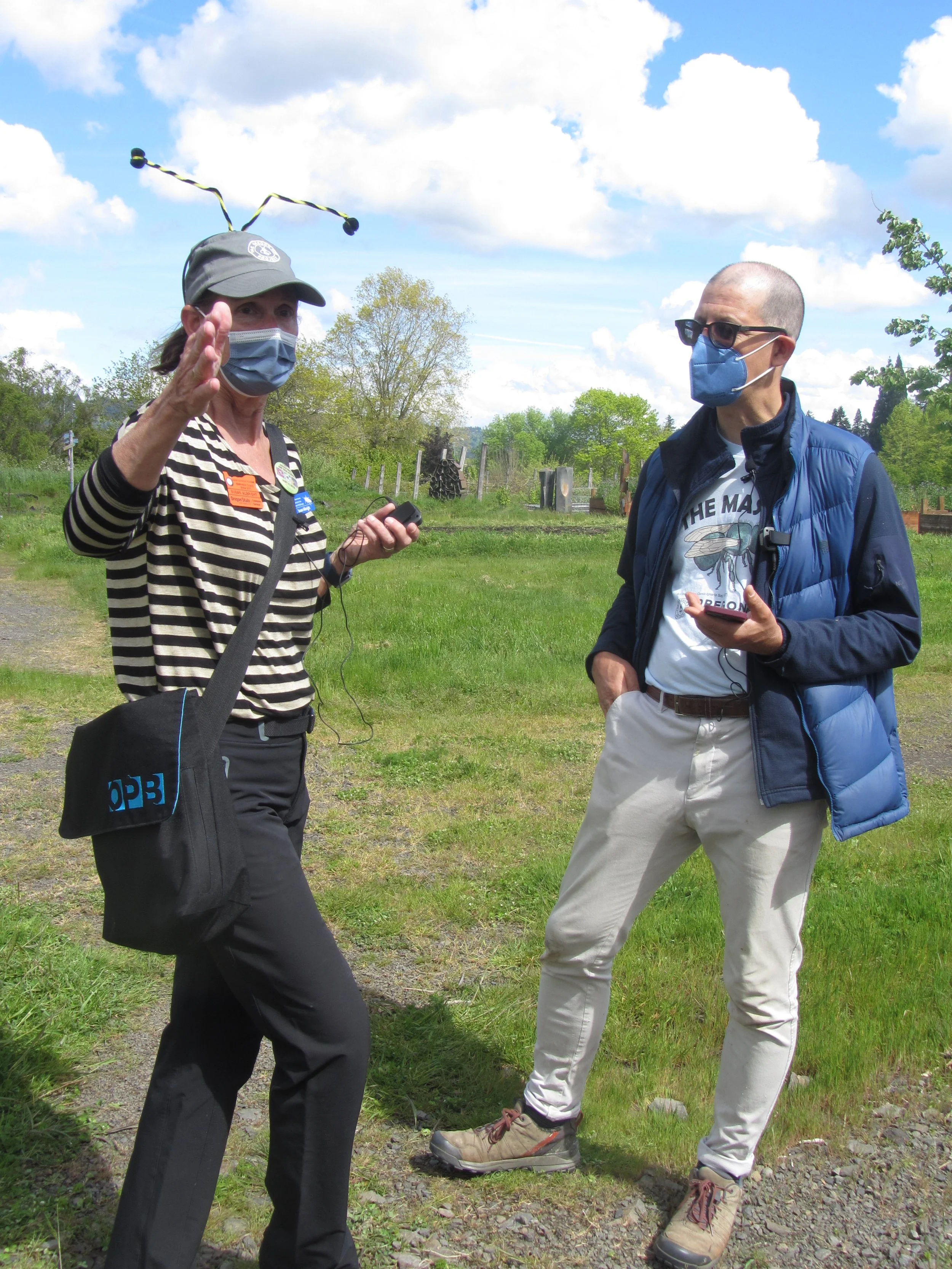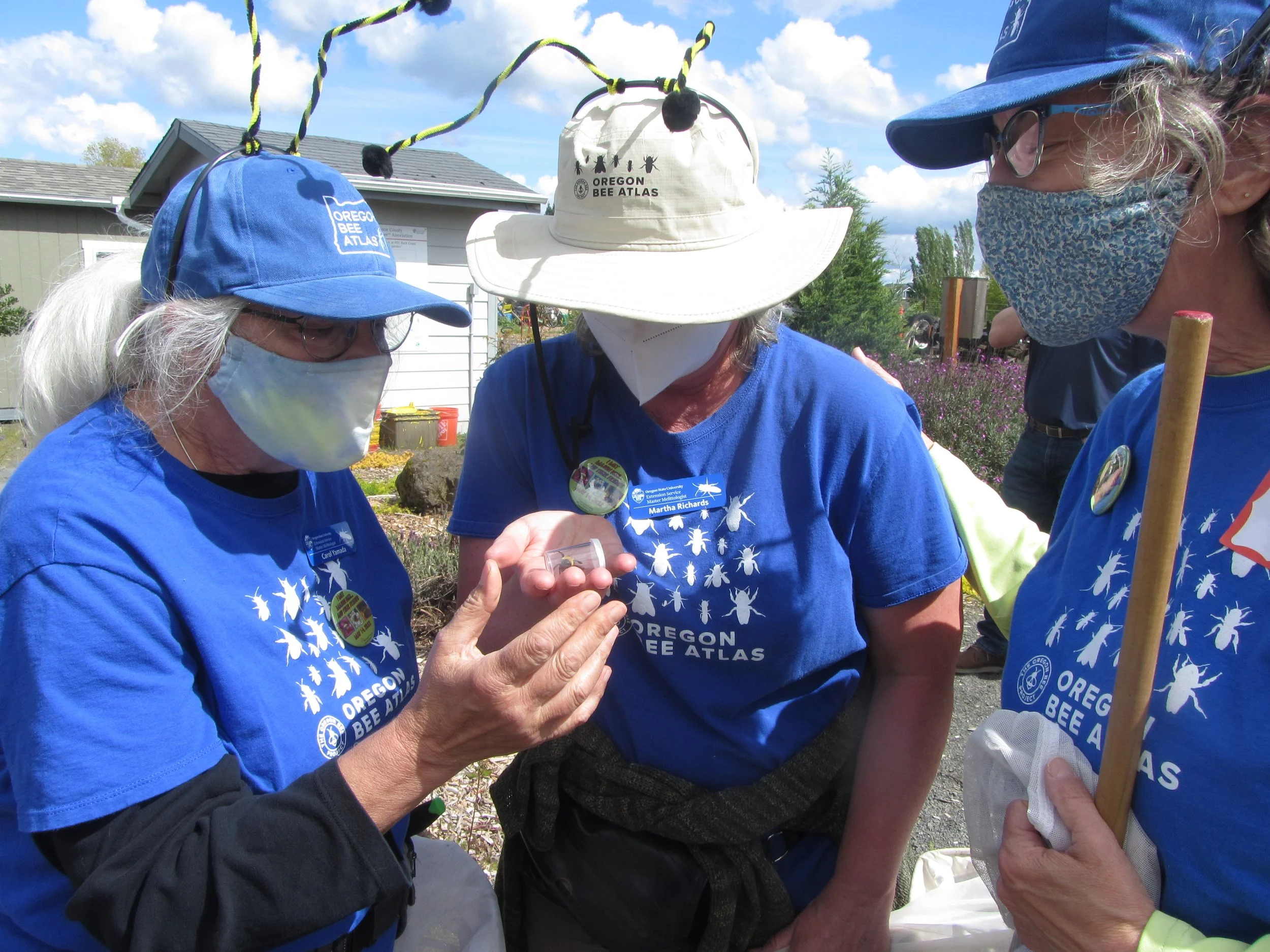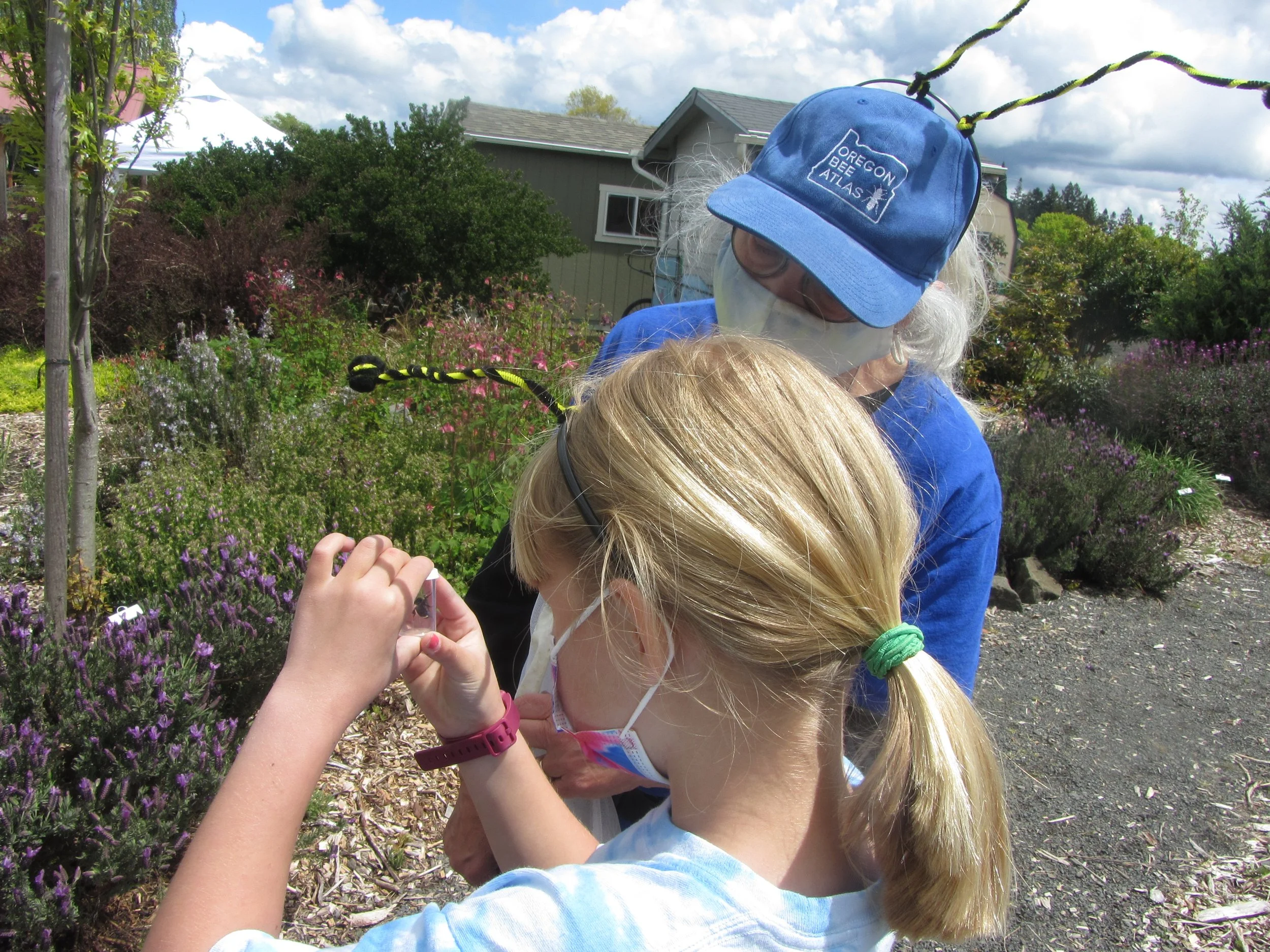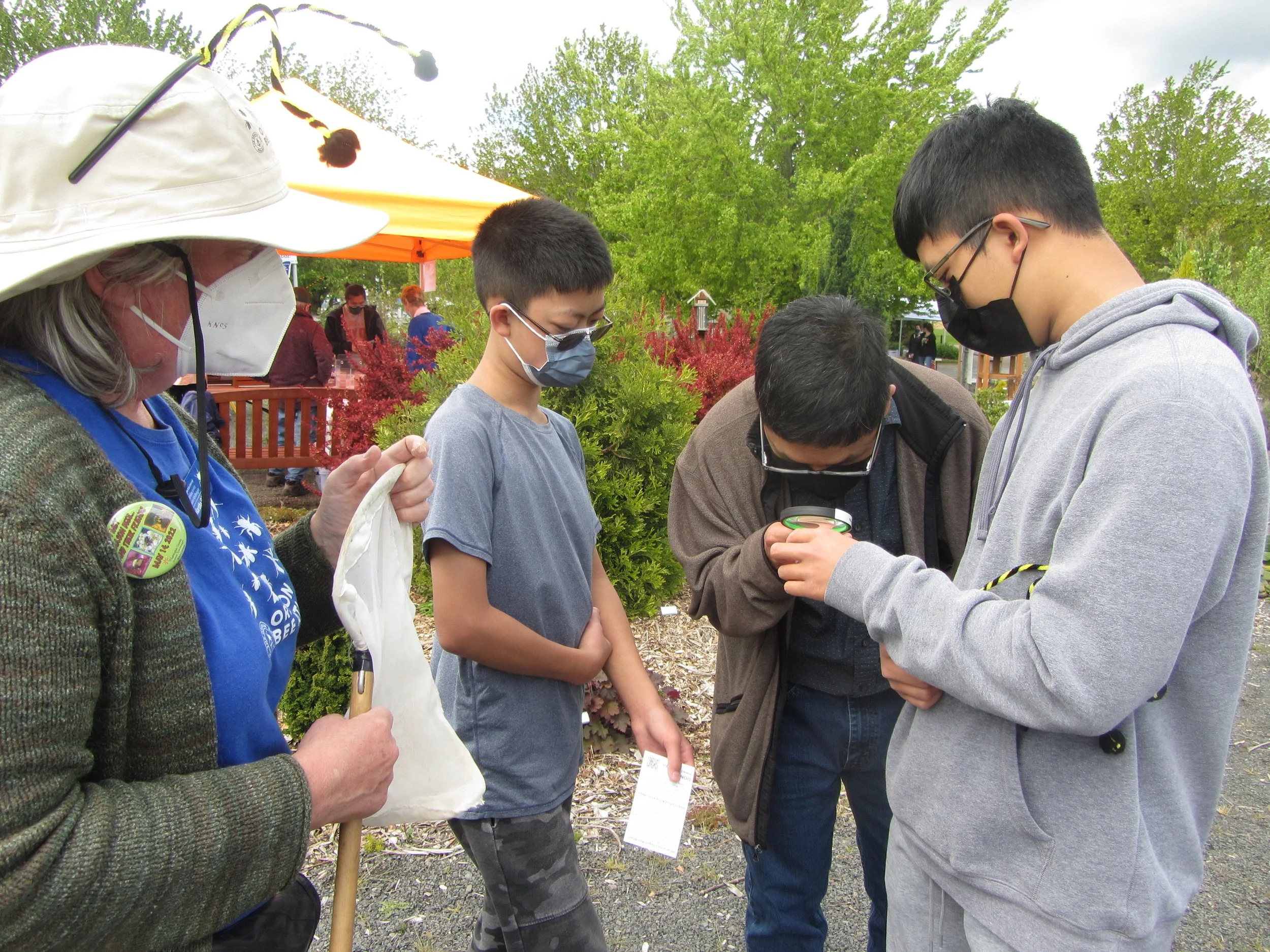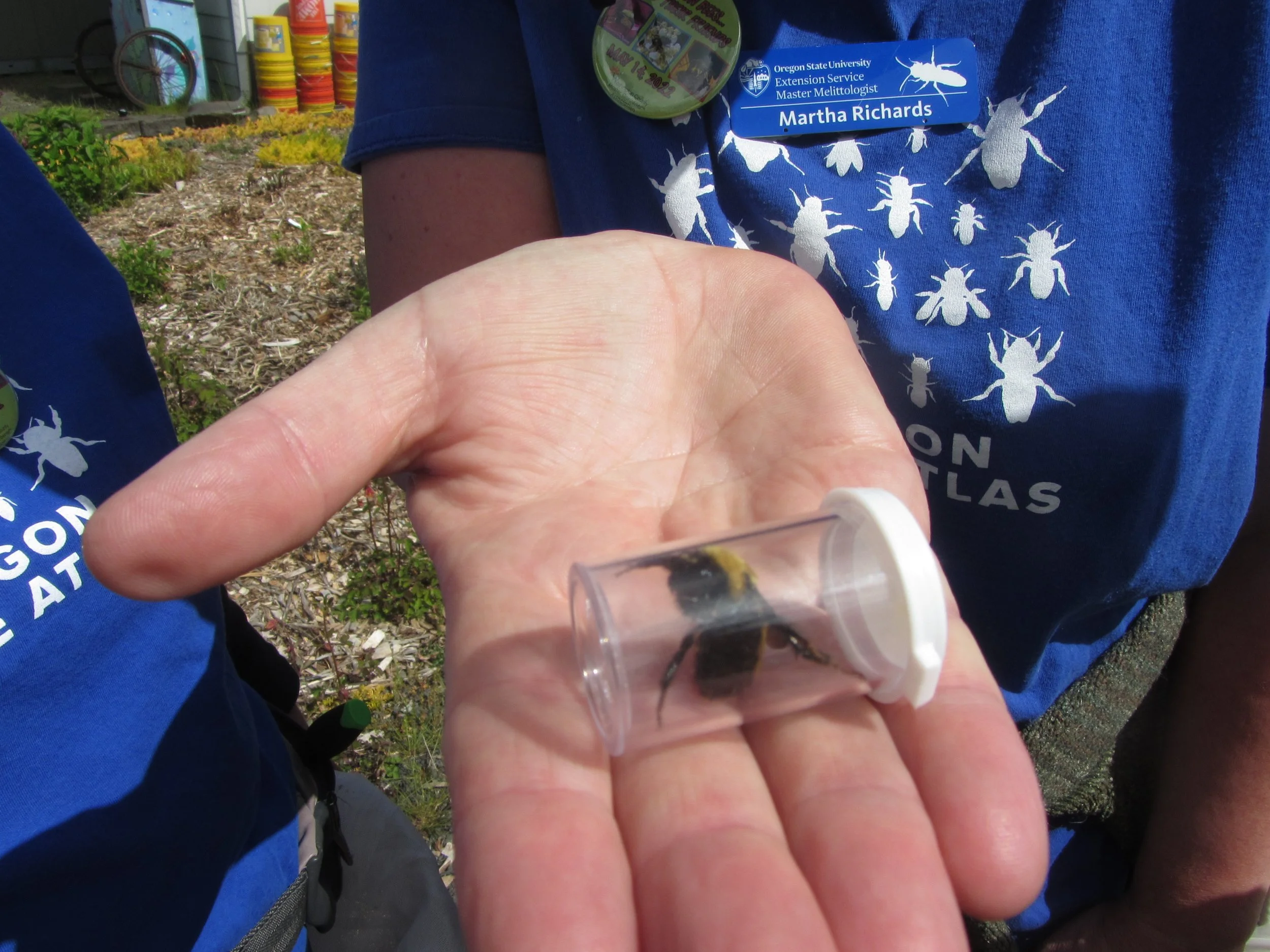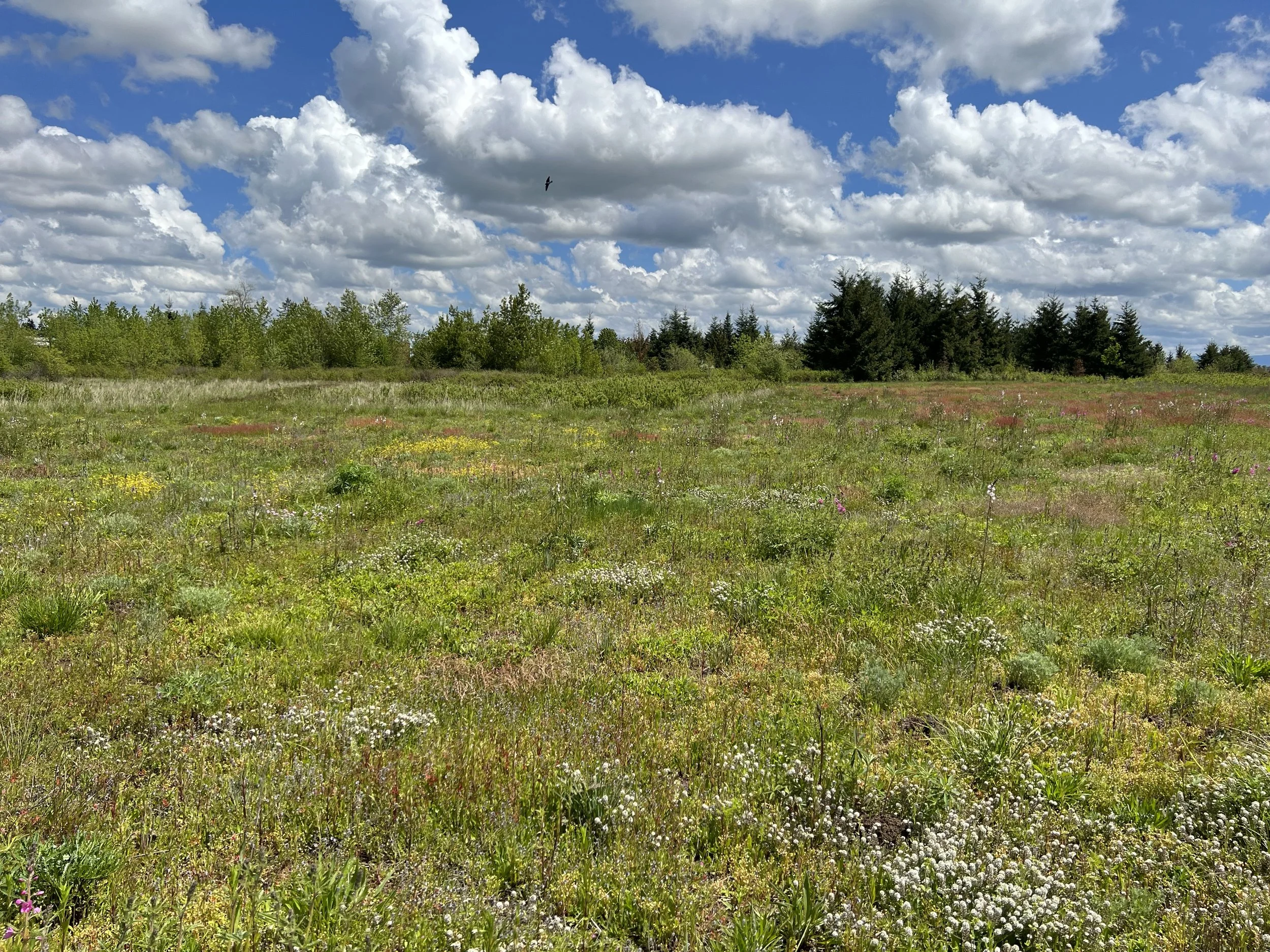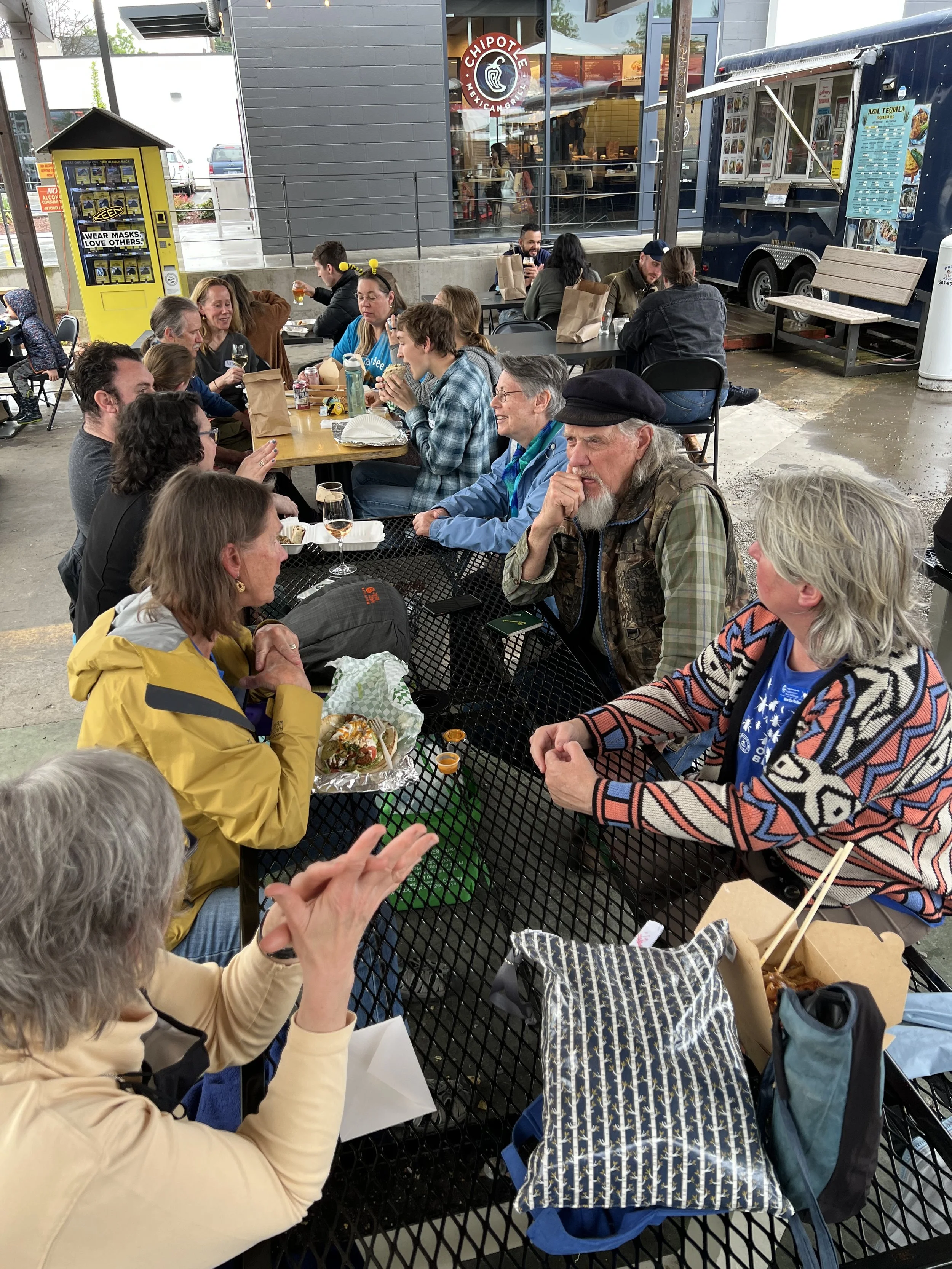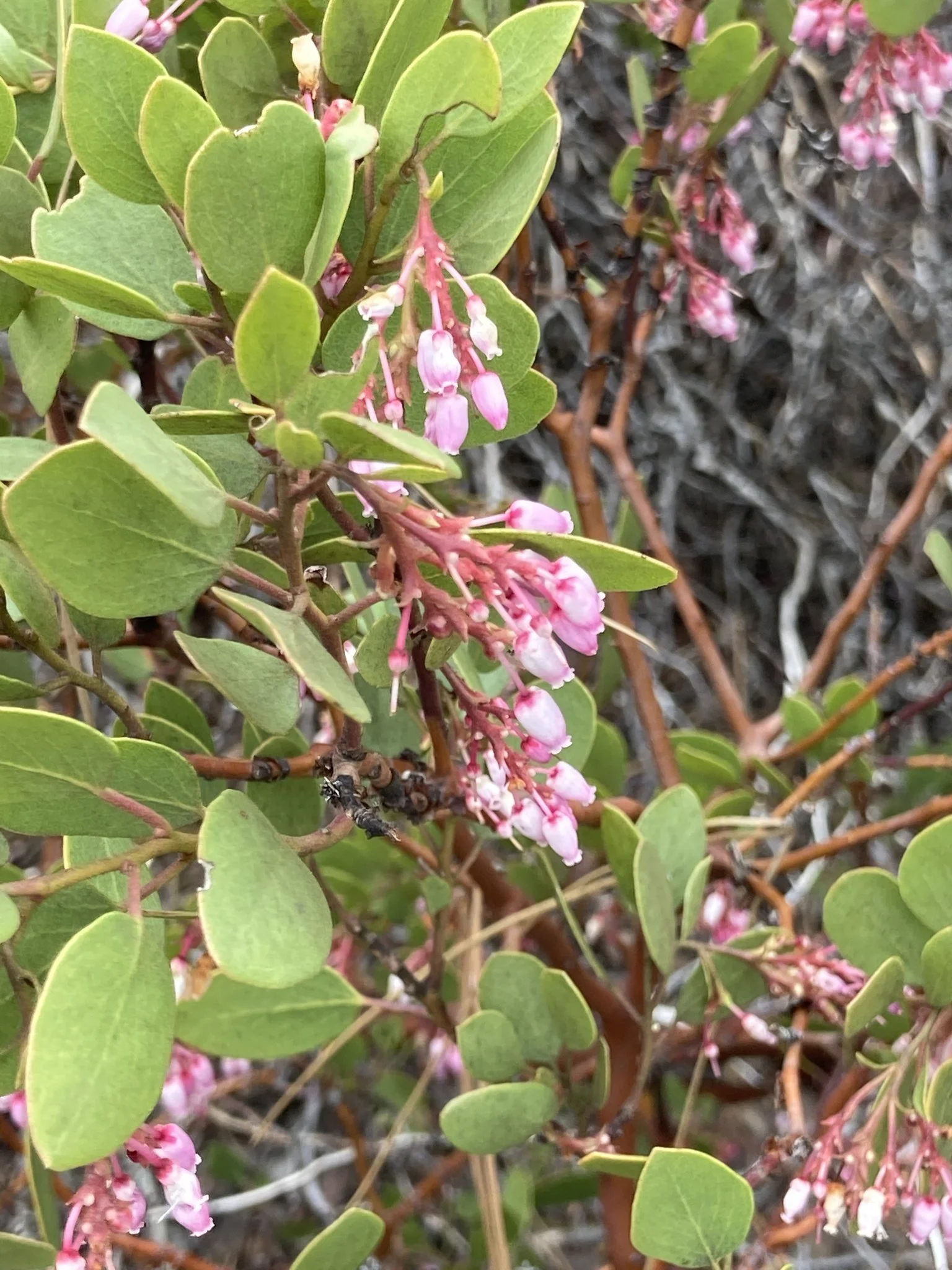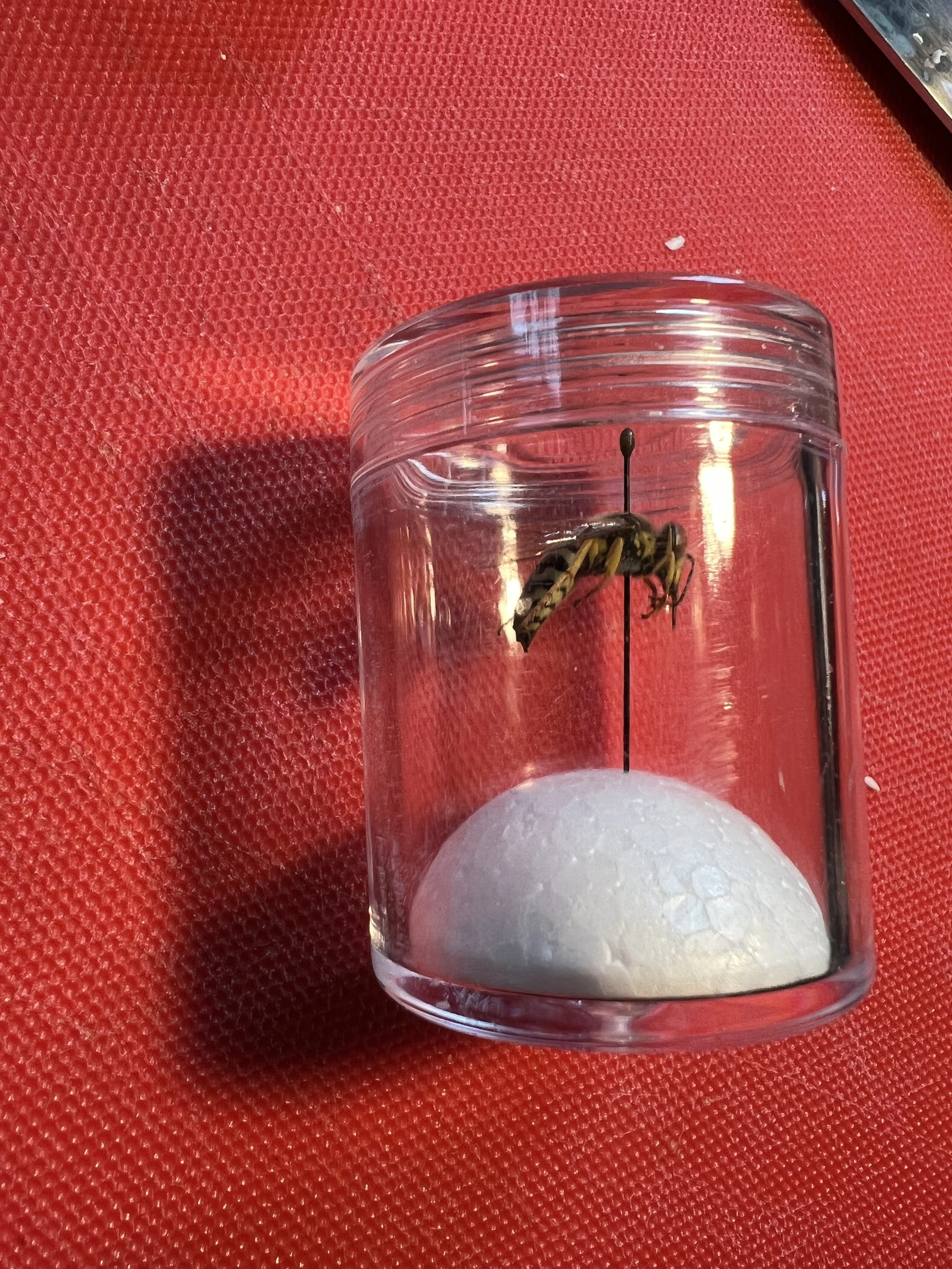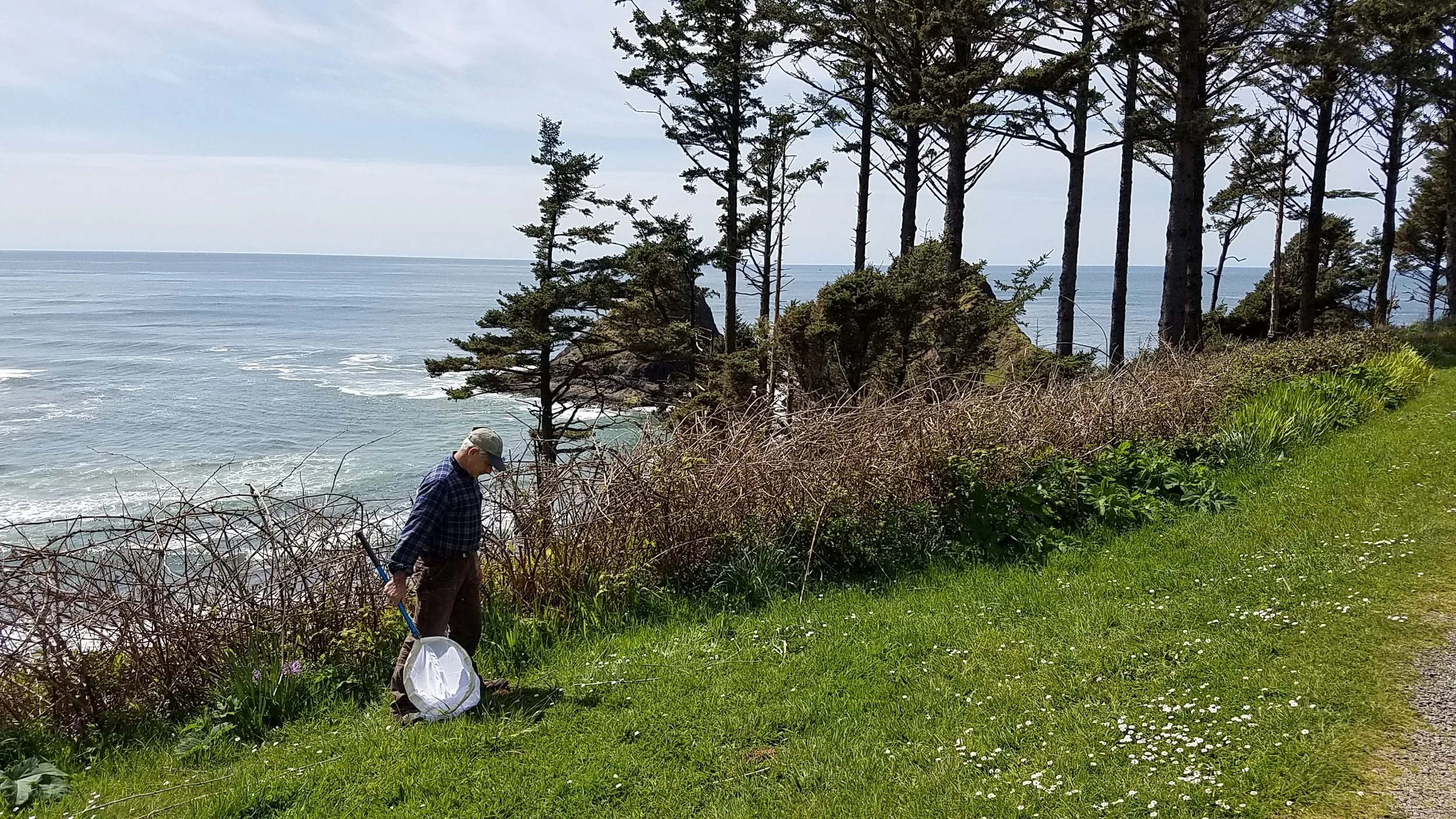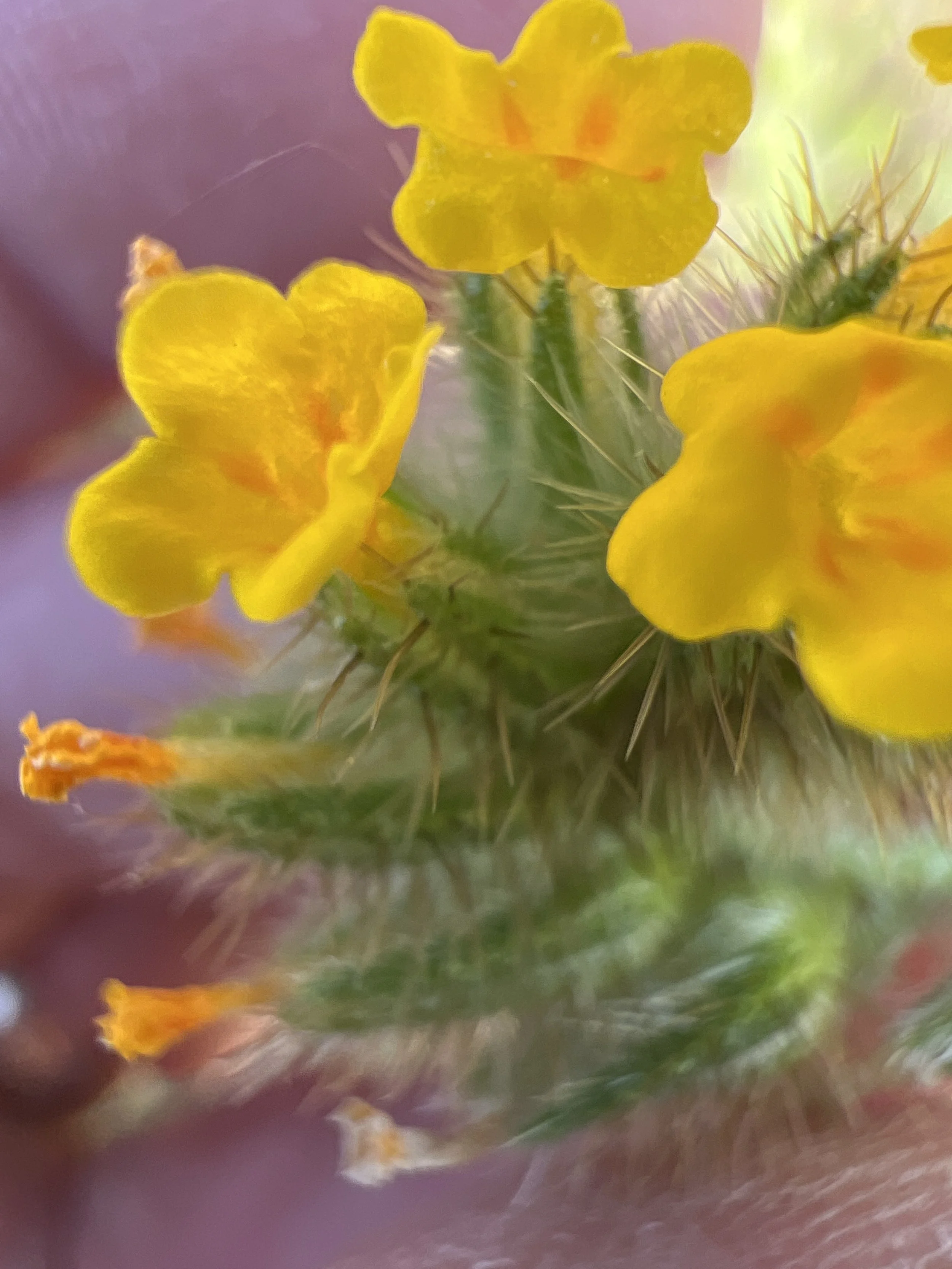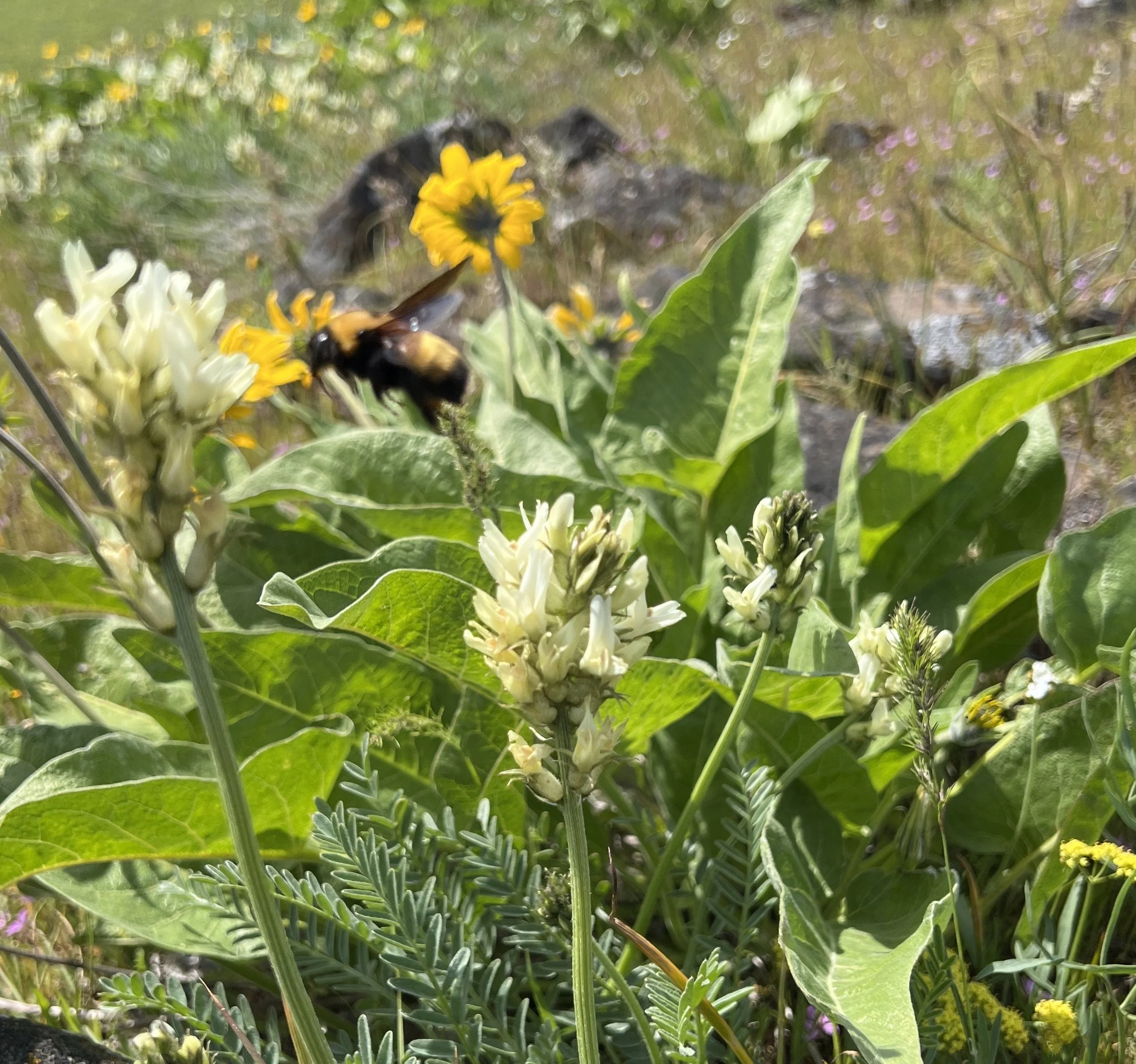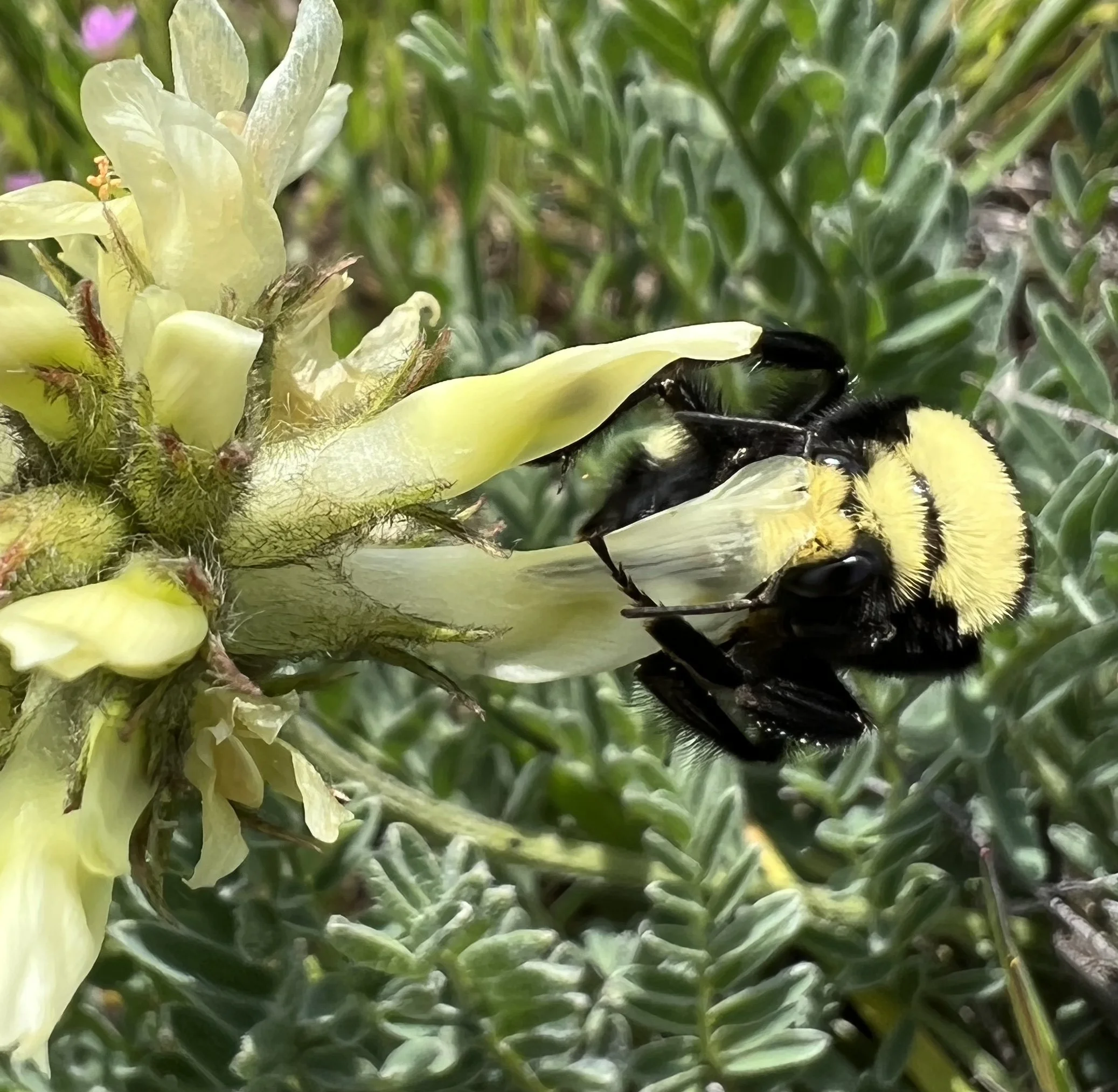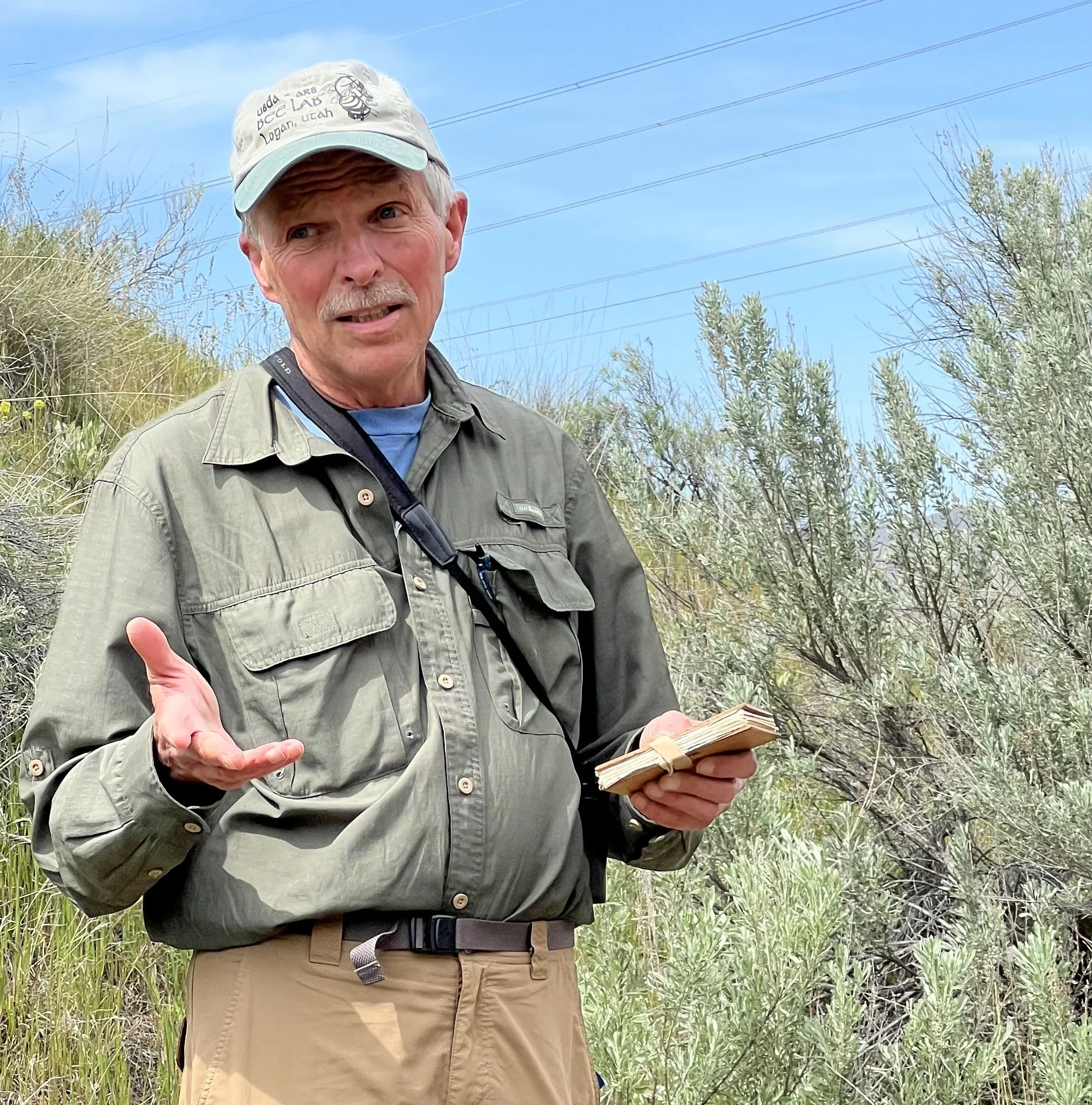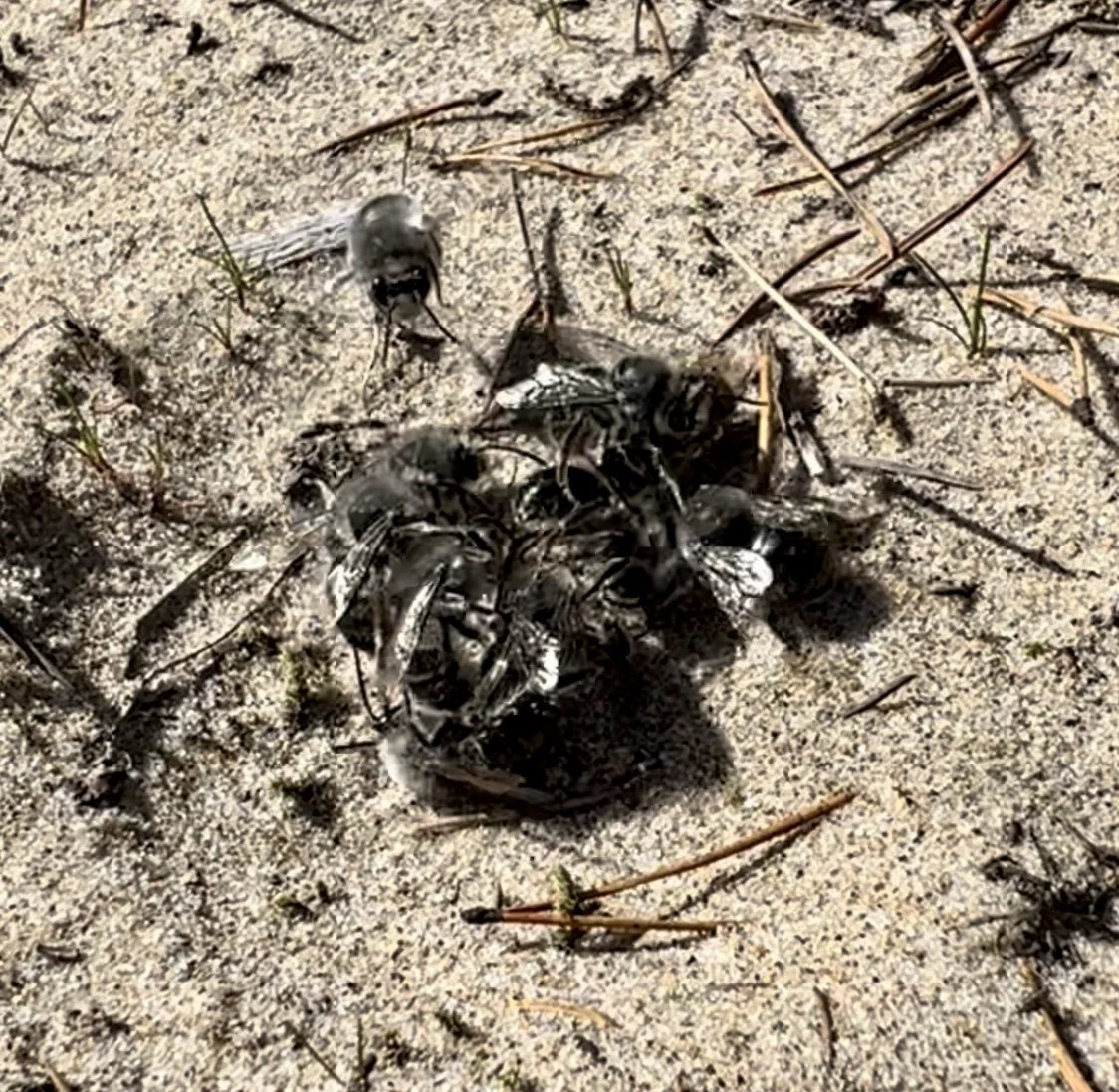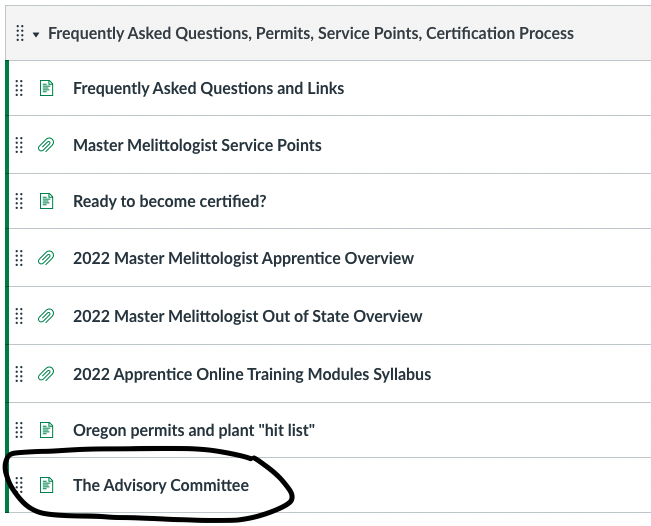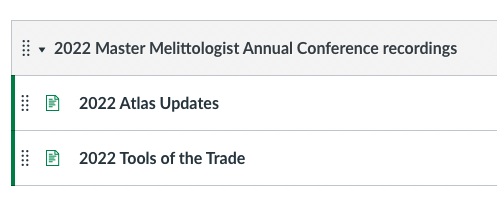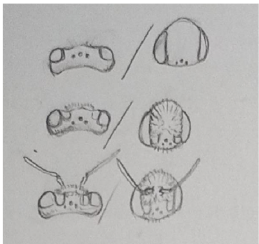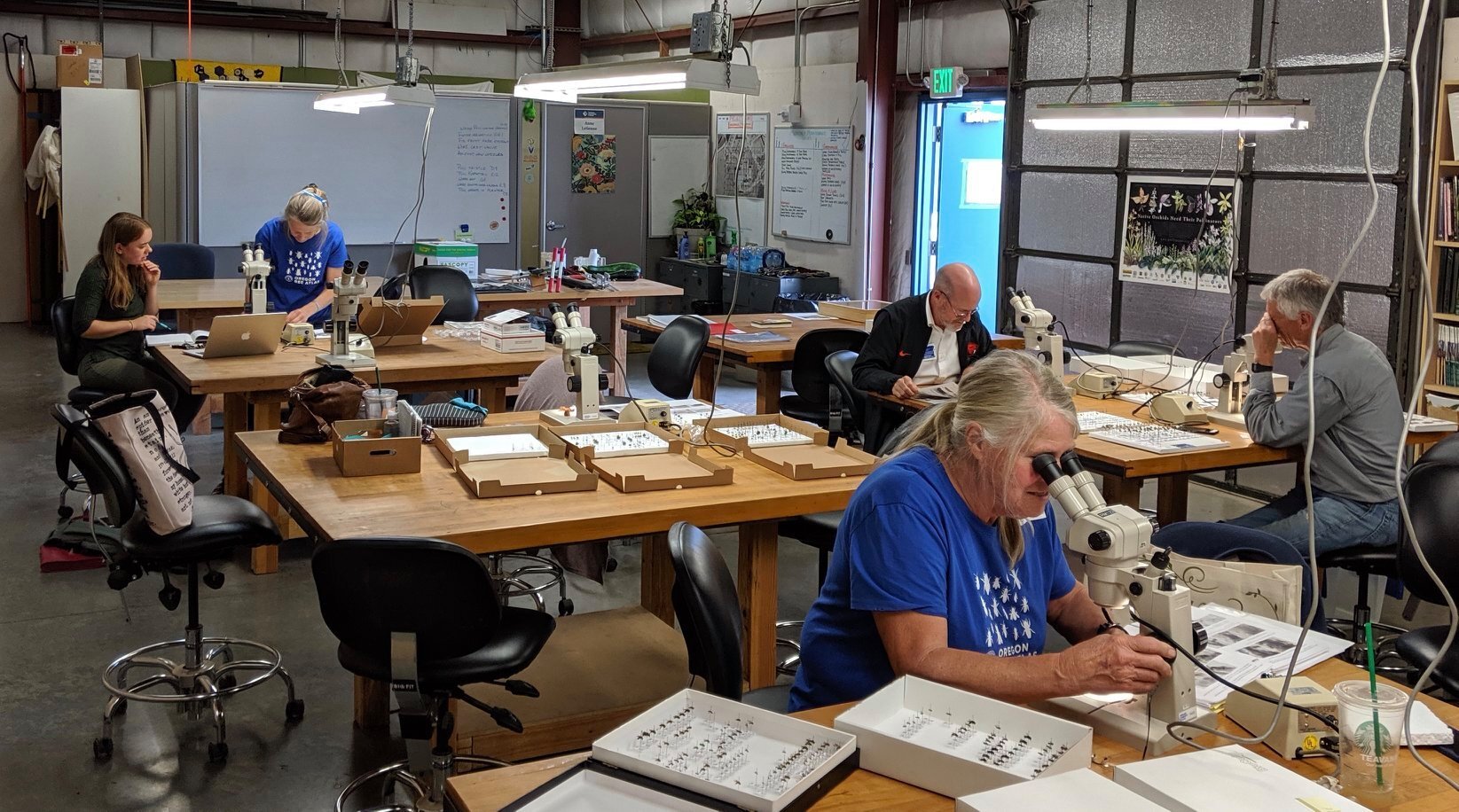There is a ton of info to share this month - outreach news, loads of new collecting and training events listed in the calendar, and more. Be sure to check the calendar of events regularly to get in on the action!
If you have any feedback or submission for Field Notes or if you want to post notes for your regional team contact Ellen Silva (e.silva@comcast.net). Please try and get your submissions in the Monday before publication.
In this issue
Field Notes
Nature Center Wildflower Show and Pollinator Festival
As in the past years, OBA participated in a tabling event at the Nature Center Wildflower Show and Pollinator Festival in Sunriver (south of Bend). Gretchen and Pete Pederson offered pollinator walks twice during the day. Even though bees were few and far between, they still made the walk worthwhile to their audience by catching several bees, flies, and beetles, examining pollinator flowers and garden design, and checking out dragonflies, birds, and beavers as well. Meanwhile, Toni Stephan and Heike Williams fielded questions at the booth and Jerry Freilich showed little and big kids (aka adults) bees, flies, wasps, and beetles under the microscope, a valuable addition to our display collections and photos. Bee mimics especially caught the interest of our visitors. We unofficially earned the title “best booth of show” according to the feedback of one visitor. (Photos thanks to Heike Williams)

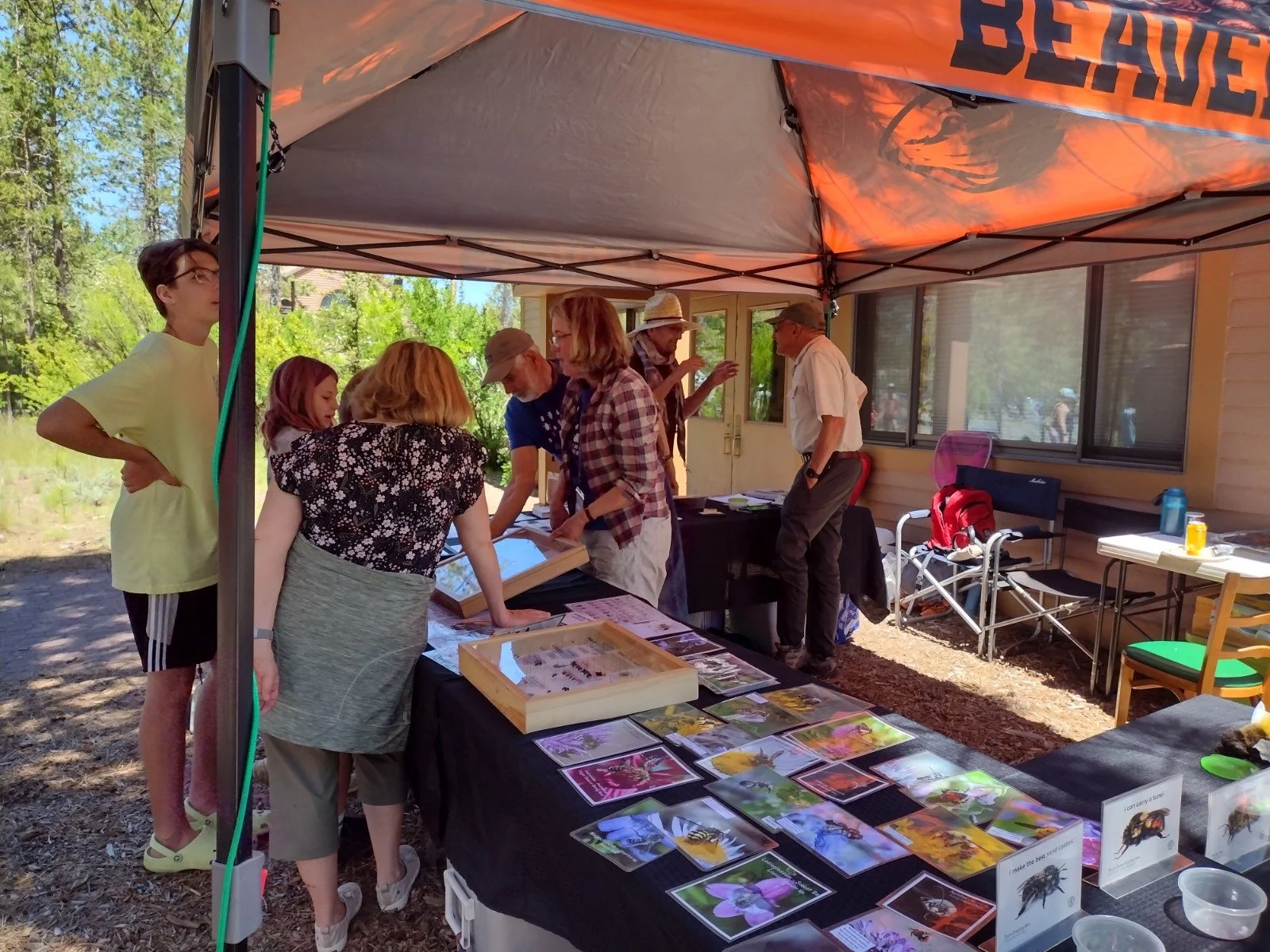
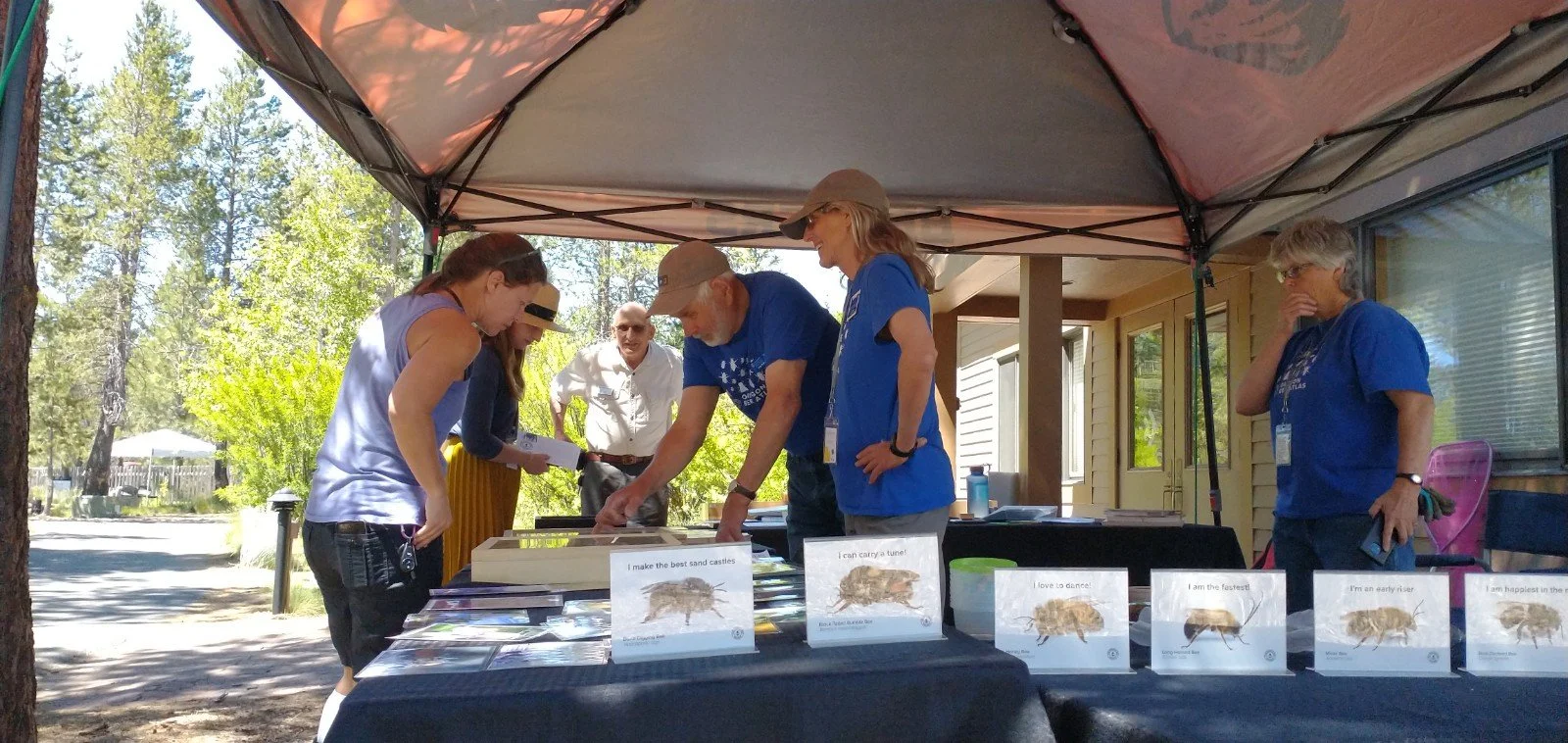
OBA Volunteers at the Pollinator Palooza!
The Jackson Bottom Wetlands Preserve in Hillsboro hosted a Pollinator Palooza event and Oregon Bee Atlas members were invited to participate! This 635-acre wildlife preserve supports an abundance and variety of birds, wildlife and diverse native plant communities. On an extremely hot day the nature center provided exhibitors with a complimentary lunch and a large shaded veranda, accompanied by a mother robin and her chicks nesting in the rafters. OBA volunteers brought bees in a jar and a glass top bee display for kids to examine, bee personality baseball cards to choose from, and bee buzzer flyers to make. For the adults, we provided more bee cards, plant lists for the Willamette Valley, tips on how to create habitat in their backyard that would be attractive to native bees, and mason bee houses to demonstrate.
Adults and kids alike loved making a pollinator pledge and being photographed as a busy bee. Thanks to Carol Yamada for creating this delightful outreach tool!
Photos below are courtesy of various OBA members who supported the event. All children were photographed with permission of their adults.
On the hunt in the Alvord…
The O’Loughlin brothers, Dan (pictured) and Michael, have been out looking for Neolarra and Heteroperdita on Tequilia and a very tiny Astragalus sp.
OBA announcements
Catch a Buzz
Catch a Buzz is July 6 at 7pm. To join, go to https://oregonstate.zoom.us/j/97230252365?pwd=TURyTXNMZ1M5SHl2TFQvajBxemtRdz09 | Password: bees
Master Melittologist Awards Committee members needed
Do you want to meet other OBA members? Do you want to help shape how we recognize OBA volunteers throughout the year and for Awards at the annual conference? If so,…
Come to our Introduction Zoom meeting to find out about becoming a Volunteer Recognition/Awards Committee member! The committee will work to create a variety of awards and recognition to better show appreciation for our incredible volunteers. The committee will ideally be 3-7 members including regionally diverse and a variety of levels of years and experience with OBA. There will be monthly meetings and a 1-2 year service term for the initial members. See the email from Jen Larsen dated June 24 OR contact Rachel Phariss at raephar@gmail.com or Bonnie Shoffner at bonnieshoffner@gmail.com for more details.
Topic: Oregon Bee Atlas Volunteer Recognition/Awards Committee Introductory Meeting
Time: Jul 12, 2022 06:00 PM Pacific Time (US and Canada)
Join Zoom Meeting by clicking HERE
It’s time to register for Bee School!
As a courtesy to our students and members, we are offering you priority registration until Friday July 1st, at which time registration will be open to the public. Registration is limited to 15 participants per session.
Prerequisites: We do not recommend this course for absolute beginners. Hone your first-year skills at one of our Microscope Trainings or open microscope sessions with the goal of attending in 2023. If you have attended Bee School in the past, we encourage you to be bold and register for the Advanced session!
Location: Each session meets all day in the microscope lab on the OSU campus in Corvallis, OR. Lodging is available on campus (a link to register for this is also provided at the link below) or from many available hotels in Corvallis.
Master Melittologist registration: $400 Standard registration: $1500
Primary instructor: Lincoln Best
August 8th - 12th, 2022: Intermediate course. The session is designed for people with limited prior experience, and is a prerequisite for the advanced course. We will be identifying specimens to genus, and typically do not recommend the course for Master Melittologists until they have completed their lab training.
August 15th - 19th, 2022: Advanced course. The session covers advanced topics suited to someone who has a few years of experience with identifying bees to the genus level. We will cover resources to identify specimens to species.
Calendar
Wow! So many new events have been added to the calendar. New collection opportunities pop up every week, it seems, so check in often. Don’t miss the camp outs (Steens Mountain in July, Cottonwood Canyon) in September and field training events (Cascade-Siskiyou National Monument and Mt. Hood in July). Go to Canvas for full info on the events and to RSVP.
Mount Ashland Bumble Bee Survey (July 11-15)
Help USFWS try and locate the federally listed bumble bee, Bombus franklini. The following information on this annual survey is listed below. The following information on the survey is provided below. Linc and other Atlas instructors will also be present. For more information, or to get on USFWS email list for this annual event, contact Jeff Everett: jeff_everett@fws.gov, 503-807-6192 (cell):
“The main event is Tuesday morning, July 12th, at 9am at the big, paved, rectangular parking area just past the ski area on Mt. Hood. If you can see the snow machines and ski lifts, you have not gone far enough. If the road turns to gravel and you get to the first camp site with the outhouses on the left next to the road, you’ve gone too far. This is the same spot we have met at in previous years. We will huddle up (but not too close – more on that below) and do some brief introductions, talk about what we are doing and why we are there, have a quick discussion on safety, and a chance to ask questions before we head up the road to the Grouse Gap trailhead, near the Grouse Gap shelter and the Pacific Crest Trail. We will have a few extra (and sanitized) nets and capture vials to loan, as well as some identification guides.
Based on field work and local reports over the past couple of weeks, our timing should be just about perfect for floral conditions. There is still a bit of snow on top of Mt. Shasta and you can find some in the shade of the north-facing slopes around Mt. Ashland, but it is going quickly. More species of bumble bees are being seen in more places, and colonies are growing quickly, so things are lining up for a busy week. We’ll survey at that spot on Mt. Ashland all day Tuesday and again Wednesday, and determine survey locations for the rest of the week after that. Field conditions are changing rapidly in some places (especially lower elevations), but there are a number of historic Franklin’s bumble bee locations in the area as well as some other interesting habitat spots we can check out. We generally wrap up the week around noon on Friday and head home from there.
Over the weekend, the storm system started several wildfires in the area, including one not far from Emigrant Lake. Most of these have already been dealt with; see the attached news release from ODF for more details including links to track things over the next few days. The weather next week could be brutal – forecast highs well into the 90s, and there is likely to be some smoke in the air. Please bring plenty of water, sunscreen, a good hat, comfortable field clothes, and anything else you might need to stay safe and comfortable. Also, Jackson County is currently in a “high” COVID status (High COVID-19 Community Level status) so we will be social distancing, wearing masks for any close work, and we will have hand sanitizer and gloves available. While more people looking increases our chances of finding our target species, there is no expectation that everyone needs to participate all day, each day – join us and contribute as much as you can, but don’t do anything dangerous or unhealthy”.
Team news
If you want to include your own team’s news in the Roundup, send it to Ellen Silva (e.silva@comcast.net) the Monday before we publish (typically, the 1st and 3d Monday of the month).
CENTRAL OREGON
Jerry Freilich is offering microscope sessions several days each week at the High Desert Museum in Bend. He came up with a clever display of a bee, wasp, fly, and beetle mounted at the same height which makes a demonstration under the microscope easy and practical.
Jan McDaniels was busy in May teaching several groups of Elementary School students about pollinators at the Prineville Wetlands. Jan was and is instrumental in establishing and expanding a pollinator garden at the Wetlands besides presenting to Wetland volunteers.
Atlas members were invited to collect bees at Windflower Farm which grows a large variety of flowers for bouquets. Debbie Spresser and Heike Williams found - again - very few bees at the first visit at the end of June (most were collected of Daisies), something we noticed all over Central Oregon both in the landscape and our gardens. The cause must be the cool and relatively wet spring. Hopefully, our precious insects will hang on to the next year!
PDX
Watch the calendar for Portland area collecting events, including the Mt. Hood field training event on July 16. ALL field training events are open to everyone, you don’t have to be a beginner to take part.
Coming this fall: microscope days and a possible social event.
What happens when you put a colorful, kid-friendly sign in the Luscher Farm Pollinator Garden in Lake Oswego/Stafford Hamlet? Hundreds of kids get educated about the annual life cycle of native bees, as well as the activities and importance of other pollinators. OBA’s own Carol Yamada not only led the effort to create the sign, she found funding for it, created the artwork, found the fabricator, and basically made it happen. She’ll be mad if we don’t acknowledge the help from her garden club in this effort, including teaching pollinator classes and holding a formal dedication of the sign on June 23, but ask any of them and they will give 98% of the credit to Carol. Way to go, making OBA proud!
Rydberg Penstemon - Noelle Landauer
What’s blooming
Combing through iNaturalist over the last week, we note our volunteers have come across some great plants on the hit list or have found bees in areas of special interest. You should be able to revisit these sites. Remember to check the permit requirements for these sites in Canvas.
Popcornflowers - (Genus Plagiobothrys) - Katharina Davitt - Klamath County (June 23)
Lanceleaf Stonecrop - (Sedum Lanciolatum) - Michele Sims - Sisters (June 21)
Rydberg Penstemon (Penstemon rydbergii) - Noelle Landauer - Gales Creek (June 25)
Please remember to include images of the flower, the leaves, and the entire plant with all your submissions. Only include images of the plants you collect on, not bees.
miscellany (not to be missed)
Now for something exotic!
Exotic Bee ID, it’s where all the cool kids are turning to identify non-native bees.
Started as a resource for those who monitor non-native and possibly invasive bees in the U.S., Exotic Bee ID has become a go-to resource for many of your fellow OBA members. With interactive keys that include really great photos of bee traits, the website is both a learning tool and an identification tool. Just a few genera are included, but some of those most important to us are. The site is especially helpful for checking your subgenus ID’s for Osmia, Anthidium, and Megachile specimens.
Screenshot from the website Exotic Bee ID
I’ve got a bee but no plant — now what
It’s gonna happen. You start out catching bees when they are foraging on flowers, but as your netting skills improve, suddenly you are catching them out of the air. And then you have a problem: How do you create an iNaturalist record for a bee with no plant?
The important information for a bee that isn’t associated with a plant is where and when it was caught and by whom. You capture this information by creating an iNaturalist record without a photo. No photos of the surrounding area or of soil or anything else. No photos! Seriously! We used to include photos with these bees, but created confusion for the iNaturalist team.
Don’t enter anything into the “what you saw” field. Just enter a few comments in the notes to indicate that this record is for one or more bees that weren’t with a flower. Your editor uses the phrase “bee in transit” and also notes if there is anything particularly interesting about the bee or bees. Examples of things one might note include the presence of a nesting aggregation, lots of cuckoo bees or bee flies in the area, etc. Save the record — it will show up as “unknown” in your list of observations. But you’ll know that it really represents a great bee.
The app may seem to protest when you enter a record without a photo, but go ahead and Save Anyway! All the location and time details will be safely recorded.
